
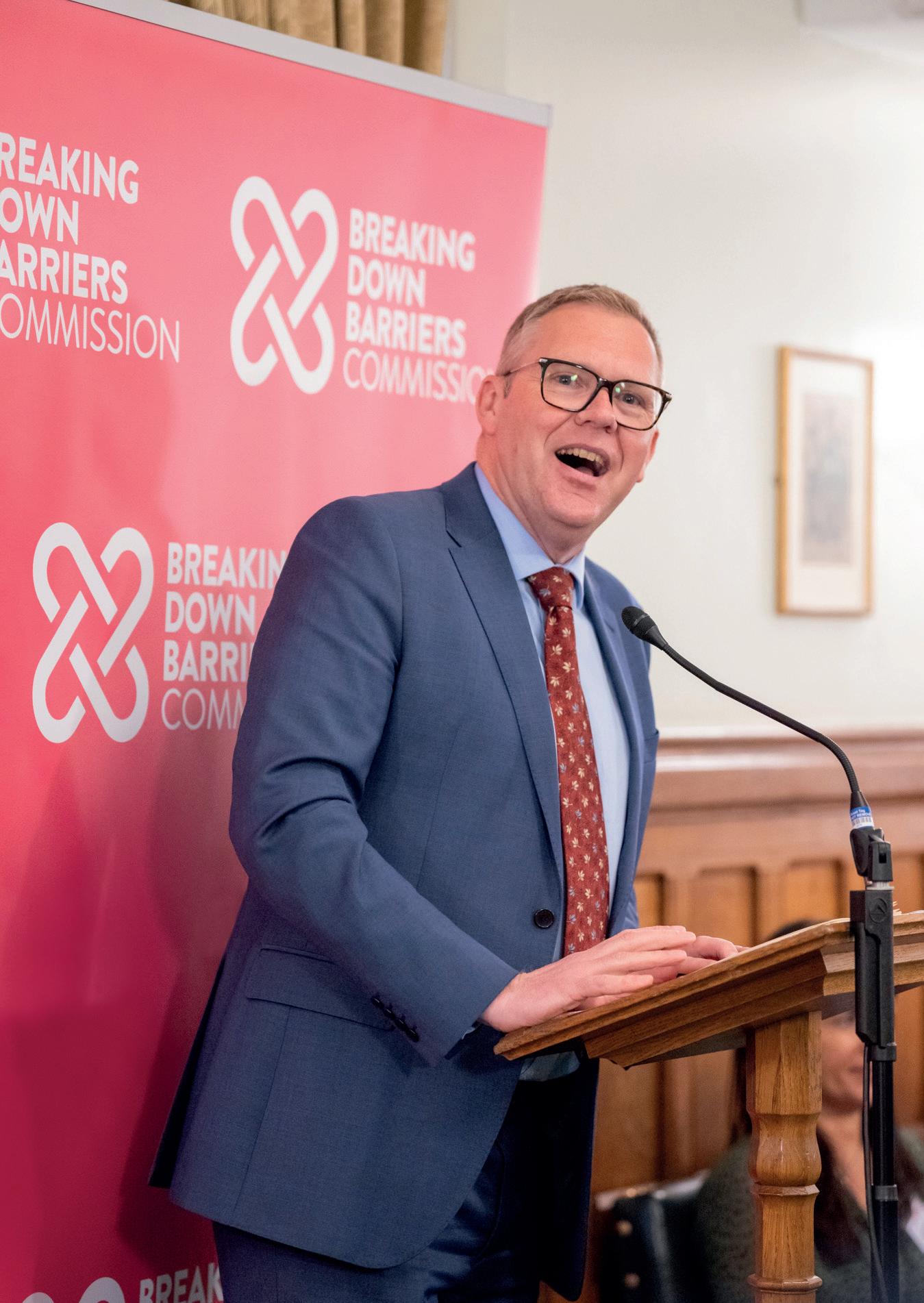


FIT FOR #09 Breaking Down Barriers Commission sets out how it will change society for the better Recognising universities’ opportunity footprints can help turbocharge change with the Rt Hon Justine Greening Partnering public and private healthcare sectors will be key to driving down waiting lists with the Rt Hon Anne Milton Good growth must be the ambition –let’s understand how to get there from the experts with Lord Walney
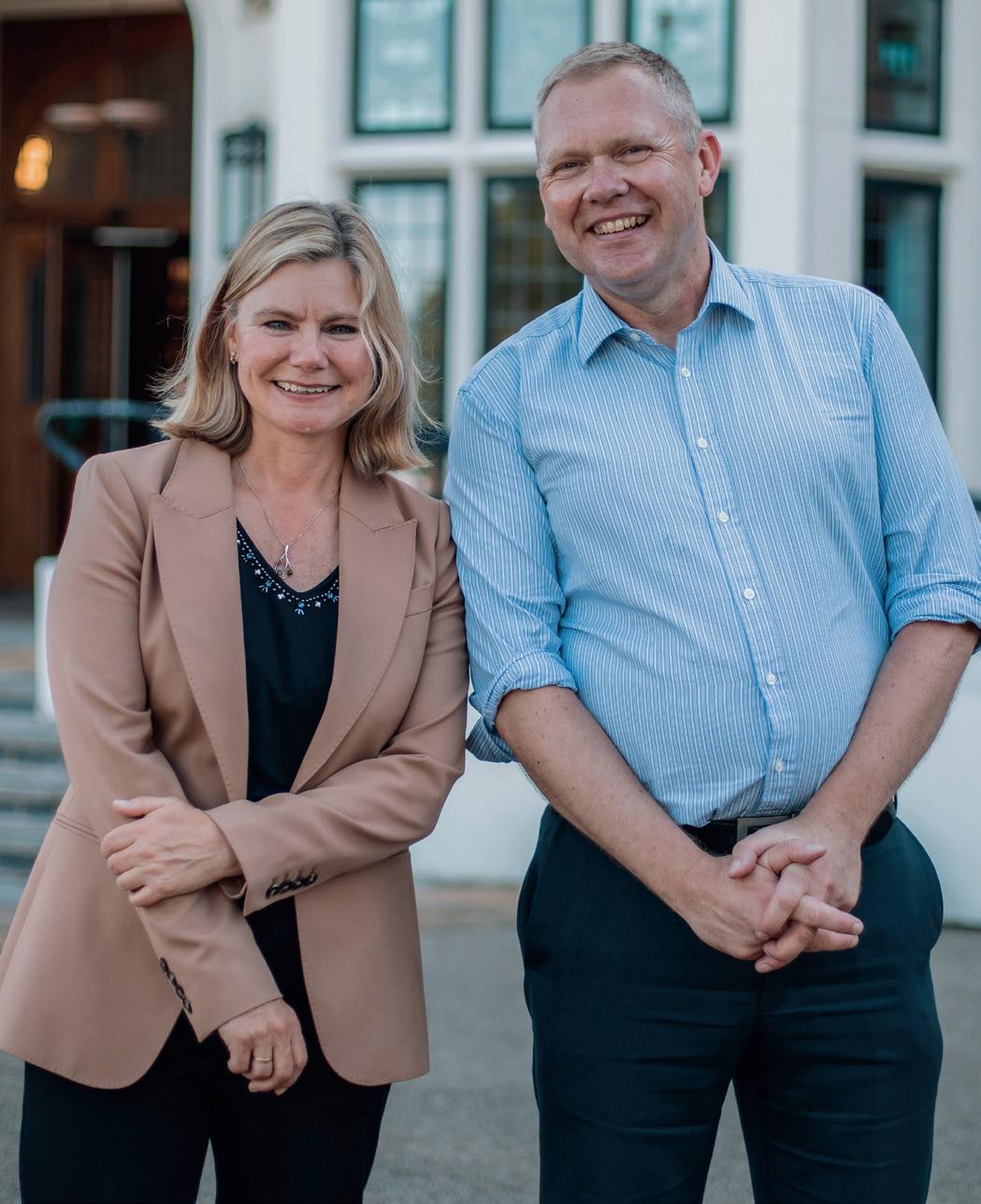
Contents Contents 10 4 Recognising universities’ opportunity footprints can help turbocharge change with Rt Hon Justine Greening 6 Good growth must be the ambition – let’s understand how to get there from the experts with Lord Walney 8 Partnering public and private healthcare sectors will be key to driving down waiting lists with The Rt Hon Anne Milton 10 A new social contract with business with Nick Forbes CBE 14 Purpose Coalition introduces the fifteenth Purpose GoalWorking in Partnership 16 Leading with Pride: The Transformative Power of LGBT Inclusion in Business with Danny Davis 18 Southeastern becomes UK’s first rail operator to publish Social Mobility Action Plan with Southeastern Rail 22 Universities as engines of social mobility: Rt Hon Justine Greening leads Solent discussion with Solent University 24 International Women’s Day 2024: How purpose inspires inclusion with Rt Hon Justine Greening 26 Shadow Energy Security Minister, Dr Alan Whitehead joins business and university leaders for Westminster Roundtable with The Purpose Coalition 28 Labour’s answer to levelling up? Breaking down barriers with Nick Forbes CBE 30 Breaking Down Barriers Commission and Curtins Announce Strategic Partnership with Curtins 32 Access to care is a major barrier to good health and wellbeing with Mark Hulsmeier 34 How a Labour government can drive business success through diversity and inclusion with The Purpose Coalition

36 Kent and Medway NHS Foundation Trust confirms its social impact commitment with Kent & Medway NHS Foundation Trust
38 Keri Purdy –Such an inspiration ! with Ramsay Healthcare UK
39 Embracing Starting Fresh with Rt Hon Justine Greening
40 Julian Sturdy MP visits Clifton Park Hospital in York to see ‘People Caring for People’ in action with Ramsay Healthcare UK
42 Partnerships will provide the impetus for a successful energy transition with Nick Forbes CBE
44 Multiplying opportunity –how learning maths as an adult in Essex is adding up with Nick Forbes CBE
46 Former Transport Secretaries call on PM to help save Hitachi The Rt Hon Justine Greening & Lord McLouglin
48 Northern Gas Networks Partners with the Breaking Down Barriers Commission to Foster Inclusive Opportunities Northern Gas Networks
49 New campaign highlights the success stories of local students who were the first in their family to attend university University of Greenwich
50 Liverpool Hope University and the Purpose Coalition launch new report to guide its social impact journey Liverpool Hope University

52 Wendy Morton MP visits Pertemps office in Aldridge to see how its commitment to breaking down barriers is making a difference in the West Midlands Pertemps
54 Delivering social impact: Anchor celebrates report launch at House of Commons Anchor
56 Breaking Down Barriers Commission announces strategic partnership with further education providers to tackle inequality NCG and Capital City College Group
58 Strategic Economic Plan approved at Cabinet Warwickshire County Council

60 Business and Trade Select Committee Chair
Rt Hon Liam Byrne joins senior business leaders for Westminster roundtable with The Purpose Coalition
62 The Breaking Down Barriers officially launches in Parliament – a new social contract to powerup Britain.
Breaking Down Barriers Commission
64 It’s time to close the UK’s life expectancy gap Callum Crozier
66 Harnessing the power of sport to drive social impact The Harrison Foundation
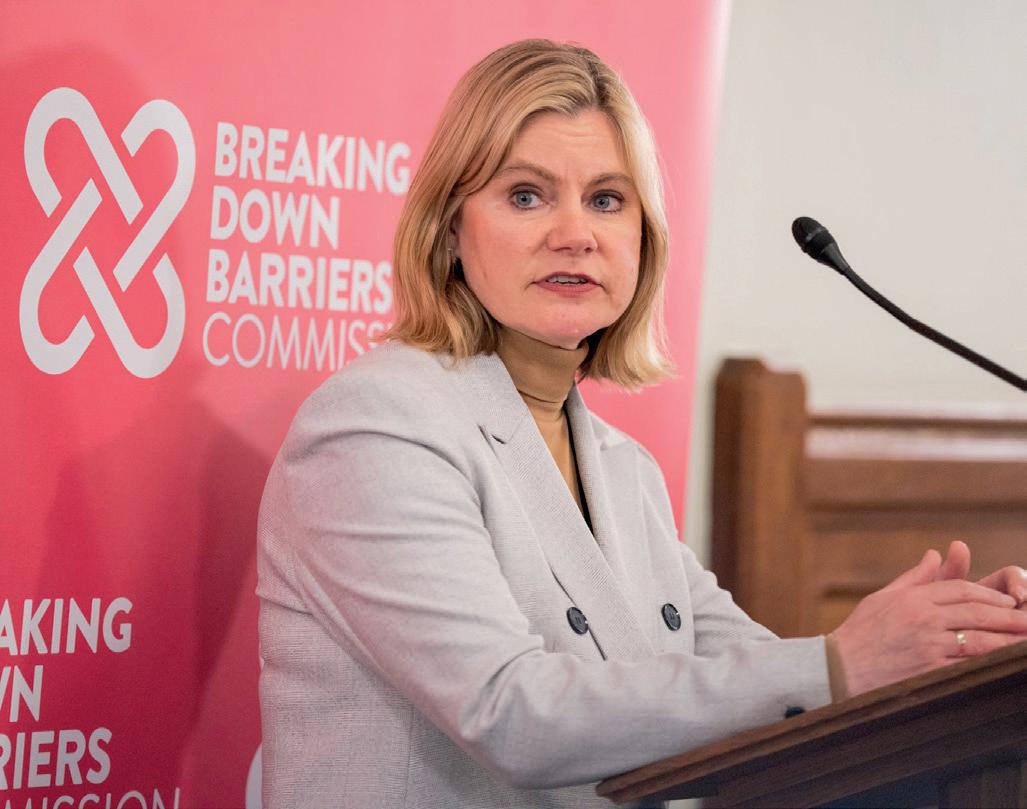
3 Fit for Purpose Magazine Contents 62 46 49 56
Recognising universities’ opportunity footprints can help turbocharge change
Higher education is a gateway to opportunity. It certainly opened doors for me that I would never have been able to walk through without it. It’s the same for millions of other people whose lives have been transformed by going to university, and it’s why thousands of pupils will be working so hard this summer to get the A Level results they need so that they can also reap the rewards our world class higher education system has to offer.
As engines of social mobility, however, the role of our universities extends far beyond their core mission of educating their students, and it is time to recognise that if we are to open up opportunity to everyone wherever they are in our country. Universities are helping to raise standards in schools, driving the economies of today and the future, alongside the contribution we all know they make through fostering individuals’ growth.
With their role as major employers, our higher education system itself is creating careers and adding value more broadly to local communities and economies through that job creation and through their spending power and that of their students. It all means that the opportunities universities generate can be transformational, not only for individuals but for the entire regions they serve – a much bigger ‘opportunity footprint.

4 Fit for Purpose Magazine The Rt Hon Justine Greening
In addition, there is so much we can learn from the university ‘mindset’ of being an anchor institution, rooted in their local areas. It’s more than just the presence of students, but also their wider social and economic contribution. Our universities are able to make a sustainable and tangible difference because they are part of communities and regions for the long term, with a significant stake in uplifting their communities. It means they can work alongside major local employers who are also instrumental in creating the sustainable opportunities that are vital for connecting students with job opportunities. It’s never been clearer that our universities are taking on that wider mindset of community and economy building.
Now, this long-standing experience of working in communities can be shared with a new generation of Purpose Coalition businesses who are also challenging themselves to widen access to their own opportunities and to improve themselves as employers where a more diverse talent pipeline can thrive. Our universities have spent the past two decades already doing sterling work on widening access and participation, especially through extensive outreach work with schools and colleges. That work educates and informs those with no knowledge or experience of university to consider that it can be an option for someone like them, regardless of their background. Rightly, the issue has been an area of intense focus for policymakers. Businesses and employers now need to do the same, learning from the huge breadth of initiatives that universities have developed to help their students get in and get on. Our work in the Purpose Coalition is to have employers offering opportunities as widely as our higher education sector has been doing.
This was examined in a report published last year as the first step in the Purpose Coalition’s Raising Standards, Creating Opportunities advocacy and policy campaign. It featured examples of best practice from across the country that were tailored to meet the particular challenges of the communities they serve, showcasing a range of innovative approaches which are making a difference. Many of our Purpose Coalition employers are already themselves asking how they can use those same insights and best practice.
A second report published earlier this month, How Universities are Breaking Down Barriers to Opportunity, looks at the final stage of the higher education pipeline as education, knowledge transfer and research all crystalise into stronger opportunities – the ‘opportunity footprint’ - and also includes inspiring case studies. In addition to the invaluable work featured in the first report, the wider ‘opportunity footprints’ we have identified are often underestimated and undervalued by policymakers. These should be integrated into a much more strategic approach from policymakers and across higher education - to create a talent pipeline that provides opportunities for graduates to access rewarding and well-paid careers; to offer entrepreneurship opportunities for students and local and regional SMEs; to drive economic growth opportunities for existing sectors; to generate world class research and innovation opportunities which create the new growth sectors of the future and to provide career opportunities in higher education as local employers.
Our report underlines that if a government only focuses on graduate outcomes, it’s clear that they are missing the much bigger picture. They are failing to acknowledge the defining, far broader role that universities play in delivering a huge raft of other benefits which uplift the areas, regions and economic sectors they serve – and beyond. That must change and, as the next step forward, there needs to be a much more robust focus on the ‘opportunity footprints’ they offer and from which business might also learn if they are to successfully nurture the talent pipeline and widen opportunity.
In the same way that universities have highly effectively shared best practice on widening access and participation, there’s a huge benefit from doing the same on best practice from the different ‘opportunity footprints’ our Purpose Coalition universities make. The higher education sector is facing unprecedented challenges. Now is the right time to acknowledge the vital role they play. More importantly, we should map out how they are already making a difference and how they can make an even greater contribution to enabling everyone to reach their potential and to the national economic prosperity that this country is able to achieve.
5 Fit for Purpose Magazine The Rt Hon Justine Greening
Good growth must be the ambition – let’s understand how to get there from the experts

Getting Britain growing again will be the key challenge for whoever takes the reins of government following the general election.
Against a backdrop of recession and a cycle of underwhelming economic indicators, each of the mainstream parties continue to decry the endemic lack of growth in the UK economy. Now in agreement that our ambition should be to return to the growth levels last seen in this country in the 1990s and 2000s, they have made a variety of pledges on how they will drive the economic growth that is required to achieve that goal. With economic policies likely to be a key battleground in the quest for votes, we will take them at their word over the coming months, analysing their strategies to assess just what is needed to achieve good growth.
Poor growth means a government can deliver less, with all the lower productivity, ineffective public services, bigger debts and growing inequality that entails. Good growth will enable a government to provide effective public services without crippling taxation, delivering robust productivity, lower carbon economies and local communities that thrive. It’s clearly a vital ambition and one which requires a focus on both elements – the good and the growth. What the next government should not do is spend so much time devising new definitions of good and what it looks like that it fails to identify and tackle the root causes of this persistent low growth. We must not allow some imagined future perfection, honed in internal party policy forums, to stifle our progress and become the enemy of good – the good this country so desperately needs.
The Labour Party has already set out an ambitious plan for change as part of its commitment to missionled government. Much of it is laudable and welltargeted although questions remain about how it will be implemented and about the speed of that implementation.
6 Fit for Purpose Magazine Lord Walney
Rushing it runs the risk of damaging our national growth mission with strategies that have not been properly thought through or have been poorly executed.
So, it’s good to see senior Labour Party figures engaging actively with businesses and to hear about what is working for them and what they believe will provide the momentum that the economy needs, with an undertaking to consult with them if they are part of the next government. Rightly, they will be at the heart of shaping the economic agenda and the Purpose Coalition has already been instrumental in facilitating many of those conversations.
The Shadow Chancellor, Rachel Reeves, recently reinforced this positive economic messaging. She reconfirmed her commitment to a ‘securonomics’ approach, aimed at kickstarting investment for growth. With a focus on renewable energy and new technologies, it will boost jobs with a skills revolution and a genuine living wage. Acknowledging that the UK is set for the slowest growth in the G7, she highlighted that if the UK economy had grown at the average OECD rate over the past decade, it would be £140bn larger today. It illustrates how the country is currently losing out and why it is so important to have a laser-like focus on turning things around.
Southeastern Railway are investing in rail infrastructure that will not only reduce its carbon footprint but also improve business and leisure travel options and connectivity. Food services company and long-term partner Sodexo, with its wide geographic reach, is raising awareness of the link between food waste and carbon emissions through its Appetite for Action campaign which plays a key role in its roadmap to net zero and decarbonisation.
We will look at our members’ wider lessons for success to develop the blueprint we need to unlock Britain’s growth
These are examples where what good looks like is very transparent. In the months ahead we will be working closely with our members to look at the ways they are successfully driving growth in the communities they serve. Often with an emphasis on apprenticeships and early careers as well as on attracting a more diverse workforce, many of our members are anchor institutions, building a pipeline of talent in the regions where they operate but also supporting a much broader economy through their supply chains. We can learn a lot from their knowledge and expertise about encouraging economic growth in areas where there have traditionally been few opportunities.
A fair energy transition will also be a critical part of good growth. A recent YouGov survey found that 59% think the government is taking too little action on climate change. One of Labour’s five missions is to build a clean energy superpower, with a commitment to create a new, publicly owned energy company, Great British Energy. Our partners in the Purpose Coalition are already exploring ways to make sure that the transition work for everyone, to drive sustained growth in a way that will not push UK industry off a cliff, costing UK supply chain jobs and leaving the UK reliant on higher carbon fuels from abroad. In the transport sector for example, Hitachi Rail and
We will look at our members’ wider lessons for success to develop the blueprint we need to unlock Britain’s growth, equipping ambitious businesses with the knowledge and tools to deliver and sustain short and long-term growth. Building on the Purpose Coalition’s partnerships with leading businesses, a new working group will seek to better understand how prosperity can be generated. It will be led by those who understand that best – the business leaders and entrepreneurs who are running Britain’s fastest growing businesses. Sharing their best practice, engaging policy makers, removing barriers and creating a better support system will put good growth at the very top of the agenda. The group will develop a series of recommendations that will help plot a successful path that will enable the country to propel towards a more prosperous and fairer future.
7 Fit for Purpose Magazine Lord Walney

Partnering public and private healthcare sectors will be key to driving down waiting lists
Since the start of the pandemic, the waiting list for routine hospital treatment has grown from 4.4 million to 7.5 million as of February this year. It’s a crisis not only for those individuals, often waiting in considerable pain and forced to put their lives on hold, but also for the NHS staff who are under significant pressure to get the waiting lists down. It’s not surprising that this is taking a toll on their physical and mental wellbeing.
There is an urgent need to tackle the situation, and it’s certainly one of the issues that is dominating the pre-election sparring we are seeing in the daily political commentary. While there are some NHS Trusts who are looking at ways of increasing productivity, there is a growing recognition that we need to use all available capacity to reduce waiting lists - and that includes the private healthcare sector.
Analysis of government figures by campaign group
EveryDoctor shows that private healthcare providers are taking on an increasing number of NHS services. These include eye surgery and ADHD assessments, with NHS services outsourcing to 2,495 sites in 2024 so far, compared to 2,000 for the whole of 2022. More than half of NHS cataract operations have been carried out by the private sector compared to less than a quarter five years ago.
8 Fit for Purpose Magazine
The Rt Hon Anne Milton
Innovative and sometimes radical thinking will be required to find workable solutions.
Ophthalmology is the only speciality where waiting times for patients are now below where they were in 2019 which demonstrates what can be achieved. Last year the Government also announced that 13 more new community diagnostic centres – eight of which are independently run – would open across England, delivering more than 742,000 scans, tests and checks a year.
Lack of access to care is a major barrier to good health, wellbeing and employment. This, alongside late diagnosis, can lead to delayed treatment of serious illness which can impact on life expectancy and poor mental health. It is also a significant factor in other barriers to opportunity – poverty, poor employment prospects and reduced financial resilience. The Purpose Health and Social Care Coalition bring together the very best of Britain’s healthcare organisations to develop innovative solutions that will reduce health inequalities, drive down waiting lists and improve recruitment and retention in the health and social care sector. They include partnerships with a number of independent healthcare providers alongside NHS Trusts who are working with us to maximise their social impact, operating as a force for good in the areas they serve.
One partner, Ramsay Health Care UK, operates 34 hospitals across the UK, caring for NHS patients as well as those using private healthcare insurance and those who choose to self-fund their care. It aims to improve the provision of services to the wider health community, reducing surgical and diagnostic NHS waiting times, delivering care to patients when they need it. It also delivers skilled job opportunities for its colleagues and progression for the communities it serves.
Leading provider of managed doctor services, NES Healthcare, has a wealth of experience in placing doctors in both independent and NHS hospitals and clinics, so it is in a prime position as part of the wider health community to harness the expertise of both private and public sectors to drive positive change.
Amid a changing political and economic landscape, it is crucial that we consider how we can tackle the pressures our healthcare sector is experiencing in a more innovative way. That includes looking at how the independent and public sector can work together, with a focus on reducing waiting times for diagnosis and treatment and delivering better quality care. That will mean longer, healthier lives for people. This is particularly important for those from more disadvantaged communities who already face significant inequalities in access to healthcare.
As part of the Purpose Coalition and Breaking Down Barriers Commission ‘Road to the General Election’ series, I joined Nick Forbes who has been working with Sir Keir Starmer’s Shadow Cabinet, in a health seminar with leading Purpose Coalition healthcare organisations, businesses and universities. We explored the key challenges in healthcare today and how Britain can adopt a new approach to healthcare where, within existing public funding, innovative and sometimes radical thinking will be required to find workable solutions. There was a particular focus on Labour’s Health Mission, following a Purpose Coalition event last year with Shadow Health Minister, Wes Streeting, who has been a passionate advocate for utilising both public and private sector solutions, particularly in relation to driving down waiting lists.
There are important social and economic reasons as to why it is imperative that we drive down waiting lists to get speedier diagnoses and faster treatment for patients. And we need to support our NHS staff better. Partnerships will be key to delivering those improvements and the best purpose-led organisations are keen to work collaboratively to make a difference.
9 Fit for Purpose Magazine The Rt Hon Anne Milton
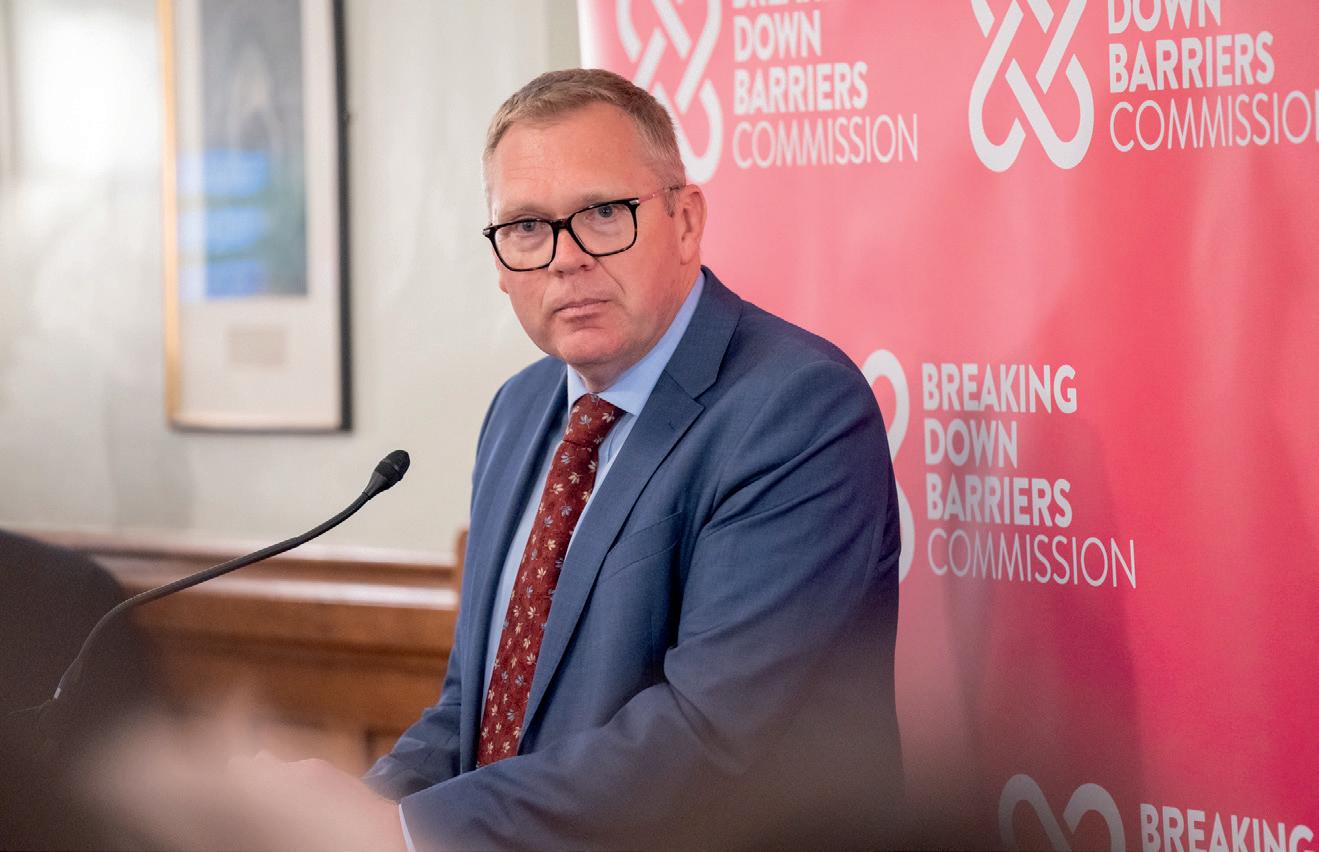
A new social contract with business
Despite the slogans, semantics and political sparring around social mobility or levelling up or equality of opportunity, one thing is certain. At heart, it is a national social and economic problem that badly needs fixing.
Growing up in the rural North East of England, the careers advice given at school was to move south if I wanted to do anything other than work in sheep farming or the local cement factory. The subliminal message, to mine and successive generations, was that the north of England was in terminal decline and couldn’t offer us a future. When I came back to my home region after university, I brought a determination to reverse this narrative, and create opportunities that hadn’t been obvious to me. It motivated me throughout the decade I led Newcastle.
However, the depth of cynicism about the lack of opportunity has become more and more of a political challenge too. In my time as a teenager, it presented as a future without hope; by 2016 and the Brexit referendum it had hardened into an anguished plea for change. The promises made by Boris Johnson ahead of the 2019 General Election built up huge expectations but, despite his big wins, any tangible results are disappointingly thin on the ground.
10 Fit for Purpose Magazine Nick Forbes CBE
Collectively, our commitment is to change our society for the better by redefining the role of business in society and seeking new ways of constructive engagement with government.
What optimism there once was has dwindled, and the lack of progress has seriously undermined the public’s faith in the ability of our political system to deliver real change.
The case for a different approach is unarguable. As well as a decade of poor economic growth, our country still has significant disparities across a whole range of indicators, from education to health and wellbeing and from digital connectivity to access to reliable infrastructure. Many inequalities are actually widening, especially in our most deprived communities. Both major political parties are committed to economic growth as the solution to these longstanding challenges. But without a careful and consistent focus on ensuring growth creates greater opportunity, we could in fact see inequalities getting worse as the economy grows.
That’s why it’s time for a new way of doing things, where the private sector works more closely with government to bridge these divides and find common ground to tackle inequality. Taking action, now, is more important than honing discussions through endless theoretical policy debates. The national Breaking Down Barriers Commission, recently launched in Parliament, is the UK’s fastest growing network of socially responsible and progressive businesses and organisational leaders. Collectively, our commitment is to change our society for the better by redefining the role of business in society and seeking new ways of constructive engagement with government. This is a collaborative, action-based approach to shaping a future where business actively contributes to improving the lives of its customers, colleagues, and communities as well as the overall economy.
Our blueprint for action, Breaking Down Barriers Commission: The Vision and Purpose, sets out the current political, economic and social landscape and why it demands a better understanding of the structural challenges that contribute to inequality. Bringing a sharp focus to the experiences gained over the last five years by the social mobility campaign led by the Purpose Coalition, the Breaking Down Barriers Commission is led by a cohort of pioneering business leaders who aim to capture the success of existing innovation, alongside designing and offering recommendations that can be taken up by industry.
The Goals-based framework developed by the Purpose Coalition helps shift thinking about the lack of social mobility being a ‘too big to tackle’ or ‘not my issue’ challenge into one where people can see more clearly how they can make a difference. At a time when our national political debates feel more fragmented and tribal than ever, this approach, translating the UN Sustainable Development Goals into a UK context, creates much-needed safe space for politicians across the political spectrum to come together and focus on the practical, evidence-based approach about what positive change can look like. We’ve reflected this sense of collaboration by adding a further additional goal for businesses to work towards – working in partnership.
We’re doing this in anticipation of a stronger sense of partnership with the next government. No administration will have all the answers, but we can’t allow talent in this country to be wasted because this agenda is seen as secondary to other, more immediate, political headwinds.
11 Fit for Purpose Magazine Nick Forbes CBE
It’s our commitment to helping with the decade of national renewal ahead and ensuring that future generations – unlike mine – feel positive and optimistic about their future.
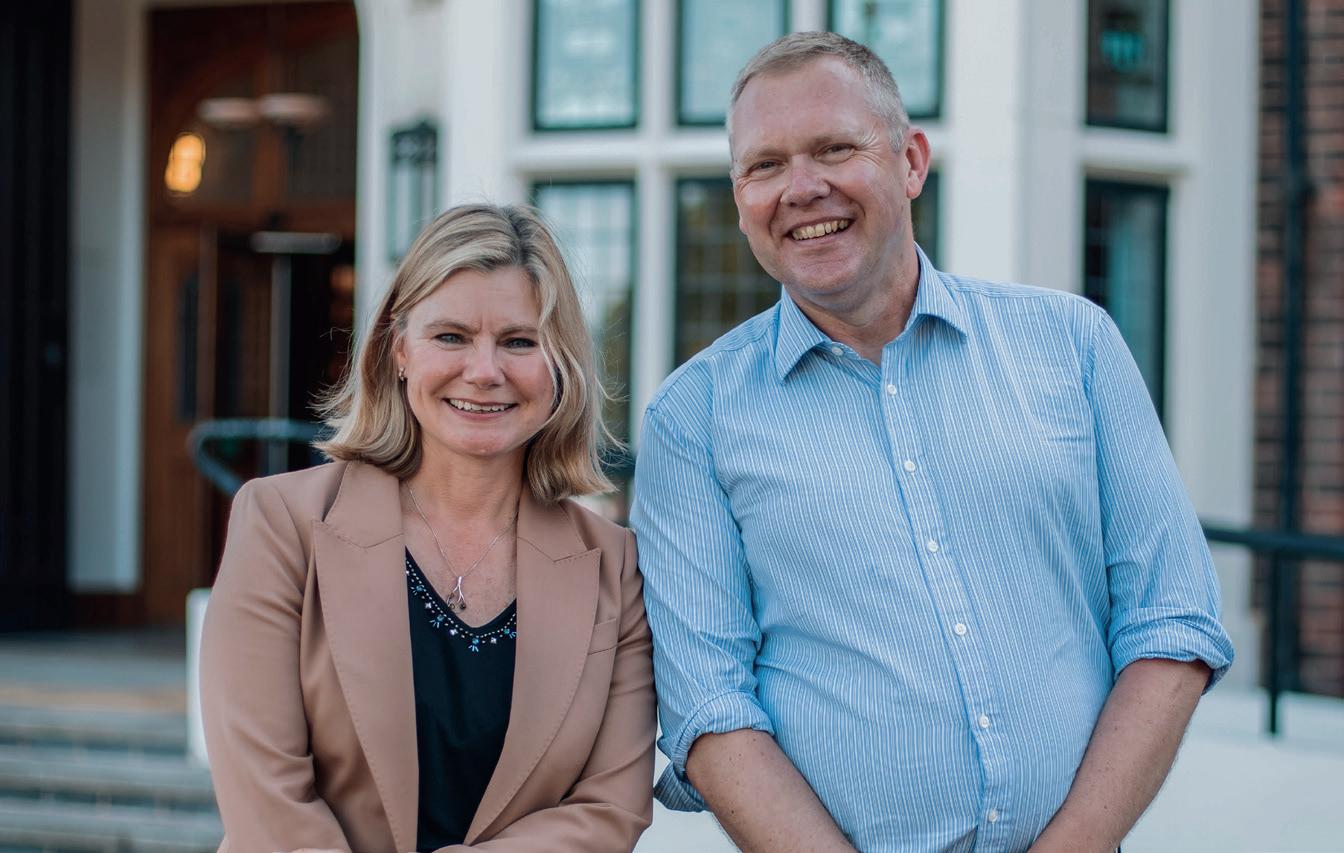
With Labour’s five long term ‘missions’ for national renewal, Sir Keir Starmer has set out a radically different approach that is deliberately focused on outcomes, with an expectation of collaboration across different sectors. The fifth mission, ‘Opportunity for All’, is a national call to action. There’s much for the next government to do that will make a difference – modernising and improving access to childcare, revising the skills system to focus on new challenges, investing in infrastructure that better connects people and jobs. And a growing number of businesses know that they have a role to play too, with individual actions adding up to a bigger cumulative
culture change that genuinely matches human talent and potential with opportunities everywhere.
Partnership is powerful. Over the coming months, the Breaking Down Barriers Commission will be working with politicians, prospective candidates and businesses to build new connections and develop new solutions so that equal opportunity is evident to everyone across the country, and not just a political slogan. It’s our commitment to helping with the decade of national renewal ahead and ensuring that future generations – unlike mine – feel positive and optimistic about their future.
12 Fit for Purpose Magazine Nick Forbes CBE


Elevate your travels with a Virtuoso Advisor. Find yours at virtuoso.com
15 Working in Partnershi p
Purpose Coalition introduces the fifteenth Purpose GoalWorking in Partnership
The Purpose Coalition has - for the first time - introduced a new Purpose Goal.
Goal 15 - Working in Partnership - will promote the need for organisations to work in partnership to boost equality of opportunity. By fostering strategic alliances with unions and citizens assemblies, organisations can harness diverse talent and perspectives, and ensure their initiatives are grounded in the needs of real-world communities.
Measures underpinning the fifteenth Goal include recognition of a Trade Union in the workplace, including active and considered dialogue percentage of partnership with external bodies in organisational activity, and percentage use of Workers Assemblies’ when taking major workplace decisions (a representative group of workers from across the organisation).
The first reports from Purpose Coalition partners utilising the new Working in Partnership Goal will launch in the coming weeks.
14 Fit for Purpose Magazine
The Purpose Coalition
The Purpose Goals, launched in 2021, set out the 15 core barriers to opportunity that exist in the UK. They are the framework adopted by organisations committed to breaking down those barriers.
The Goals, developed by the Purpose Coalition, collectively map out the key barriers to opportunity in the UK, offering a blueprint for businesses and other organisations to focus their efforts. The 15 Purpose Goals encompass a broad range of societal and economic issues, from early childhood development to workplace inclusivity, highlighting the multifaceted nature of inequality and the need for a comprehensive approach by responsible businesses and other organisations. The Goals also emphasise areas where many businesses and other organisations have best practice to share such as when it comes to fair career progression, open recruitment, and good health & wellbeing.
For businesses and other organisations, the Purpose Goals provide a structured framework to assess and enhance their positive role in society by working to break down each of the 15 barriers to opportunity. The Goals have been adopted by more than 100 businesses and other organisations including Leonardo, UK Power Networks, bp, the Co-op Group, Sodexo, Pennon Group, Channel 4, Reed, the BBC, NHS Trusts, UK councils and UK universities amongst others.
15 Fit for Purpose Magazine The Purpose Coalition
The Goals,
for businesses and other organisations to focus their efforts. Positive destinations Post 16+ 3 Successful school years 2 Strong foundations in Early Years 1 Right advice and experiences 4 Fair career progression 6 Open recruitment 5 Good health and well-being 8 Widening access to savings & credit 7 Closing the digital divide 10 Extending enterprise 9 Building homes & sustainable communities 12 Infrastructure for opportunity 11 Achieve equality, through diversity & inclusion 14 Harness the energy transition 13
developed by the Purpose Coalition, collectively map out the key barriers to opportunity in the UK, offering a blueprint
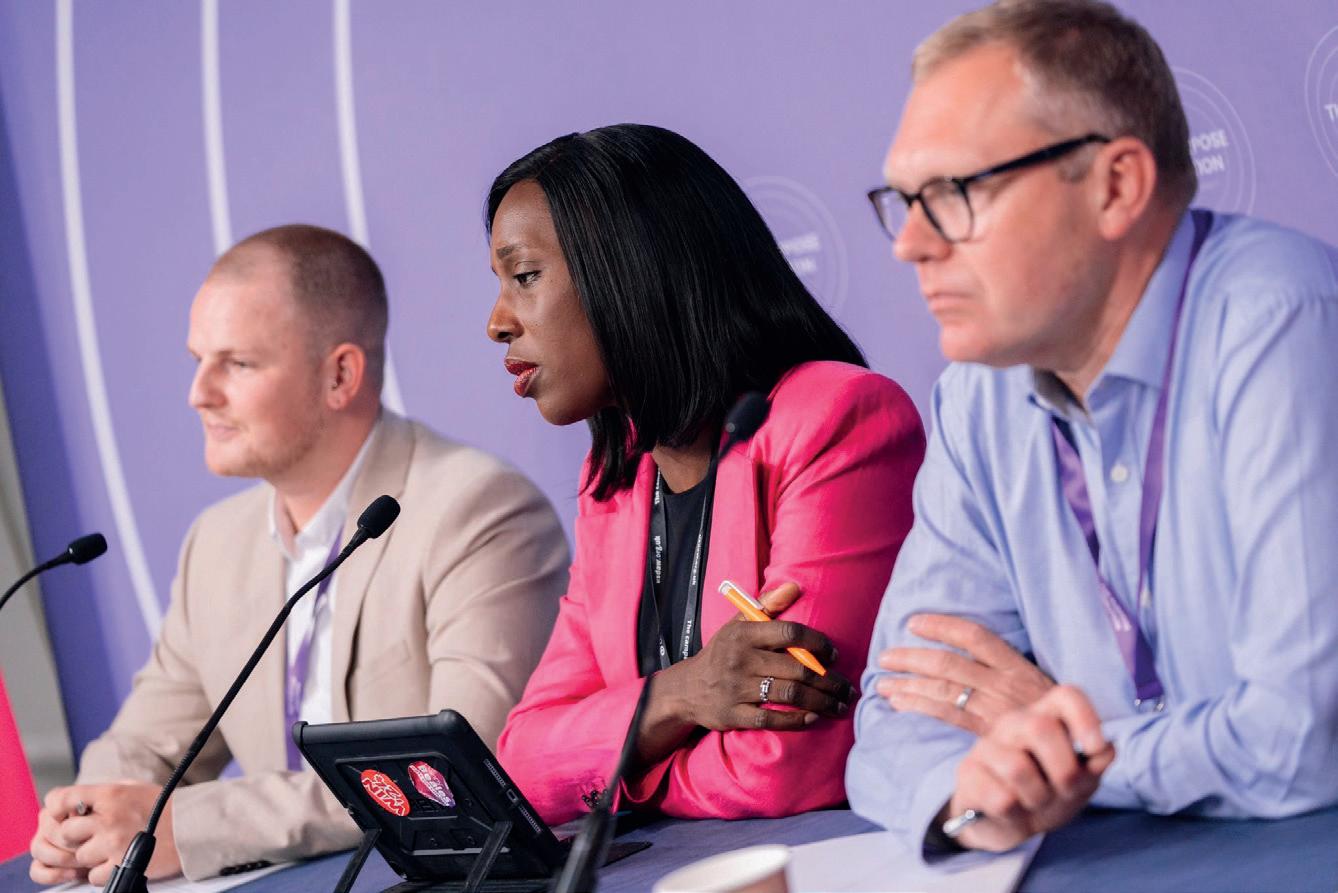
Leading with Pride: The Transformative Power of LGBT Inclusion in Business
As we come to the end of the annual LGBT History Month, it’s an opportune moment to reflect on the significance of LGBT representation in the workplace and the critical role of purpose-led employers in fostering an environment that is not just open but inclusive.
16 Fit for Purpose Magazine Danny Davis
Authentic commitment from employers involves actively listening to the needs of LGBT employees, engaging in continuous dialogue, and adapting practices to ensure they are not just theory, but in everyday reality.
This celebration isn’t just about acknowledging the past and present struggles and successes of the LGBT community - it’s also about shaping a more inclusive and equitable future, which is especially important in the professional world.
Representation matters. For the LGBT community, and I know from my own experience, seeing yourself reflected in various roles and levels within an organisation can be really powerful.
Yes it’s about visibility, but it’s also about the deeper message it sends to everyone in the organisation: that you can get ahead no matter who you are or who you love. I see this in my day to day spending time with Rt Hon Justine Greening and Nick Forbes CBE.
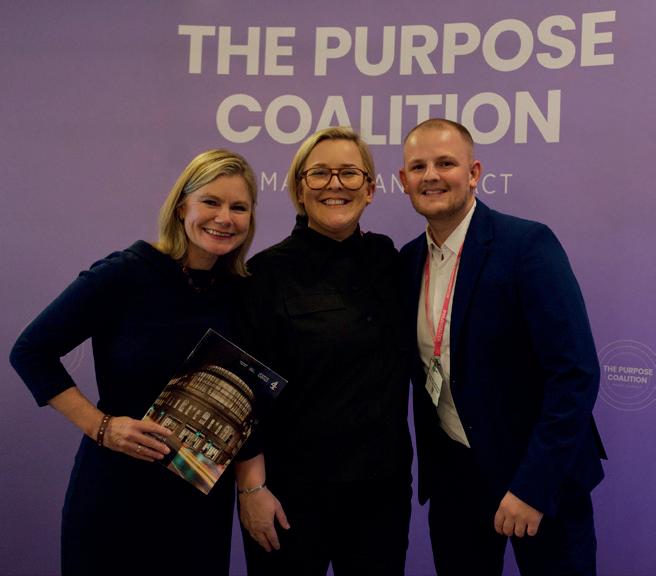
Purpose-led employers play a pivotal role in this. These are organisations that go beyond the bottom line to ensure their workplaces understand that diversity is not just a buzzword, pride isn’t just about a month long celebration, but instead a key component of their success. They recognise that a diverse workforce brings diverse perspectives, ideas, and innovation that can drive the company forward in new ways. Not to mention often bringing higher levels of employee engagement, satisfaction, and loyalty.
Authentic commitment from employers involves actively listening to the needs of LGBT employees, engaging in continuous dialogue, and adapting practices to ensure they are not just theory, but in everyday reality.
This commitment means recognising that the journey towards inclusivity is ongoing and requires effort and observation. It’s about creating an environment where employees feel safe to express themselves, share their experiences, and know that their voices will lead to meaningful action.
As we wrap up our celebrations for LGBT History Month, let’s not forget the importance of continuous action and advocacy to ensure that every workplace is a space where everyone, feels valued, respected, and empowered to be their authentic selves.
We live in a diverse nation, and it’s high time the benefits of this diversity are fully realised in the workplace if we’re to truly break down barriers to opportunity for everyone in the UK.
17 Fit for Purpose Magazine
Danny Davis
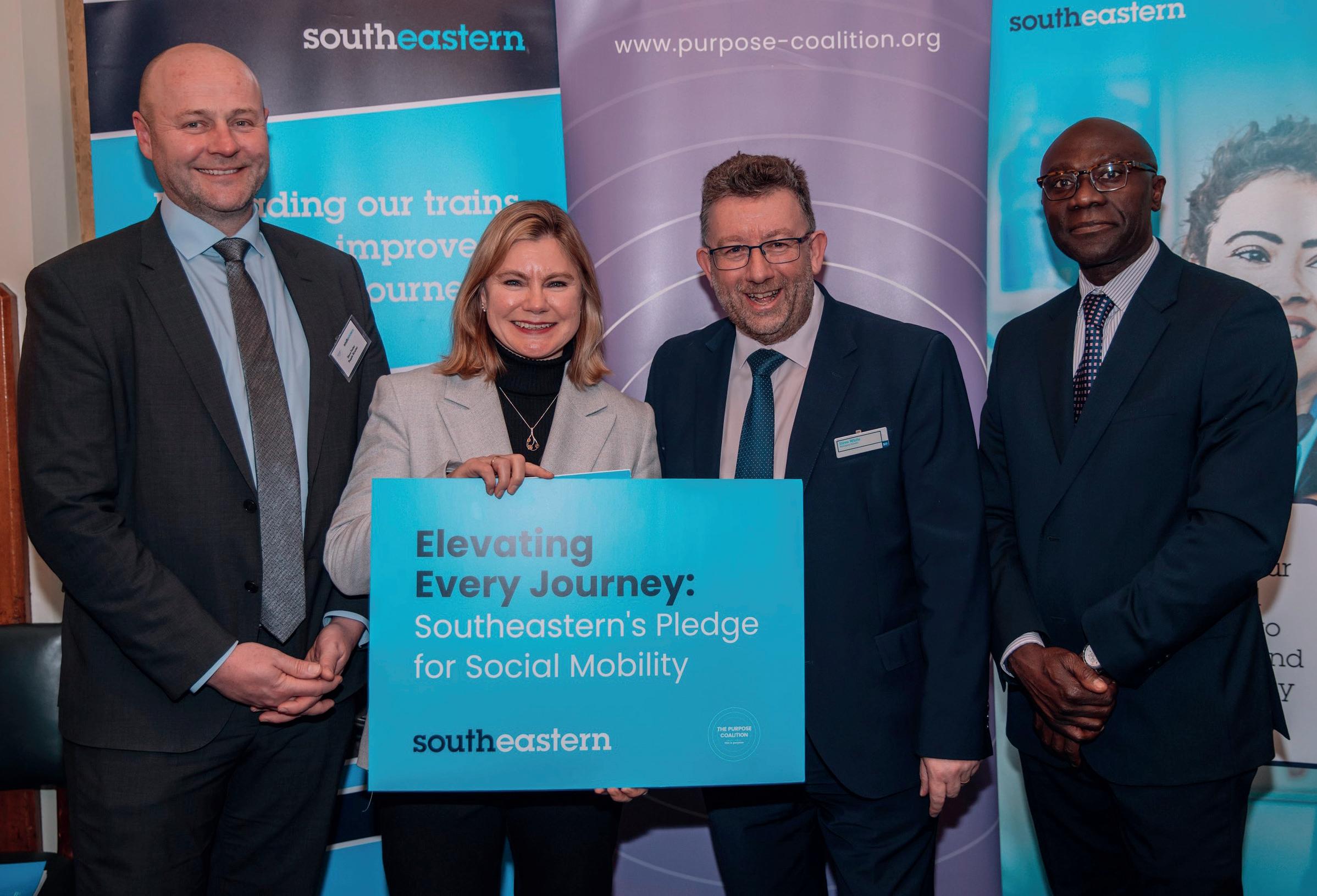
Southeastern becomes UK’s first rail operator to publish
Social Mobility Action Plan
A new report which highlights the role that the railway sector can play in boosting social mobility was launched this week in Parliament by Southeastern and the Purpose Coalition.
18 Fit for Purpose Magazine
Southeastern Rail
Southeastern is one of the country’s biggest and busiest rail operators, linking south east London, Kent and parts of East Sussex . Its extensive network spans a diverse region, encompassing thriving cities, underserved suburbs and scenic rural landscapes including coastal areas.
With a workforce of over 4,500 people, it provides over 1,700 trains and up to 500,000 passenger journeys per day working closely with Network Rail.
The Social Mobility Action Plan charts Southeastern’s activities to boost social mobility against the framework of the Purpose Goals which map out 14 barriers to opportunity and includes different life stages as well as wider issues like good health and wellbeing alongside sustainable communities.
Despite the South East having one of the lowest proportions of the country’s social mobility ‘coldspots’ at just eight per cent - it is a region that is also home to areas of severe deprivation. Thanet, for example, is the 52nd worst performing area in the UK for social mobility and most of its key indicators are below the national average.
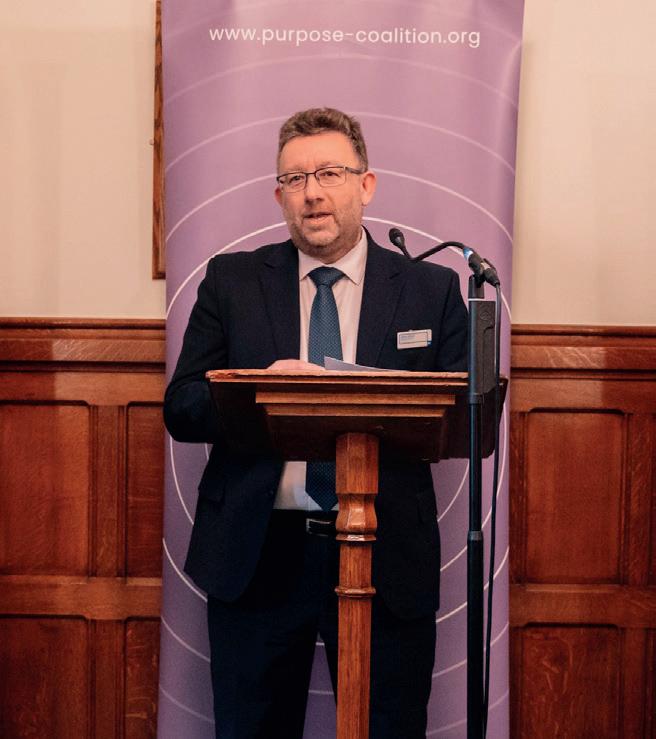
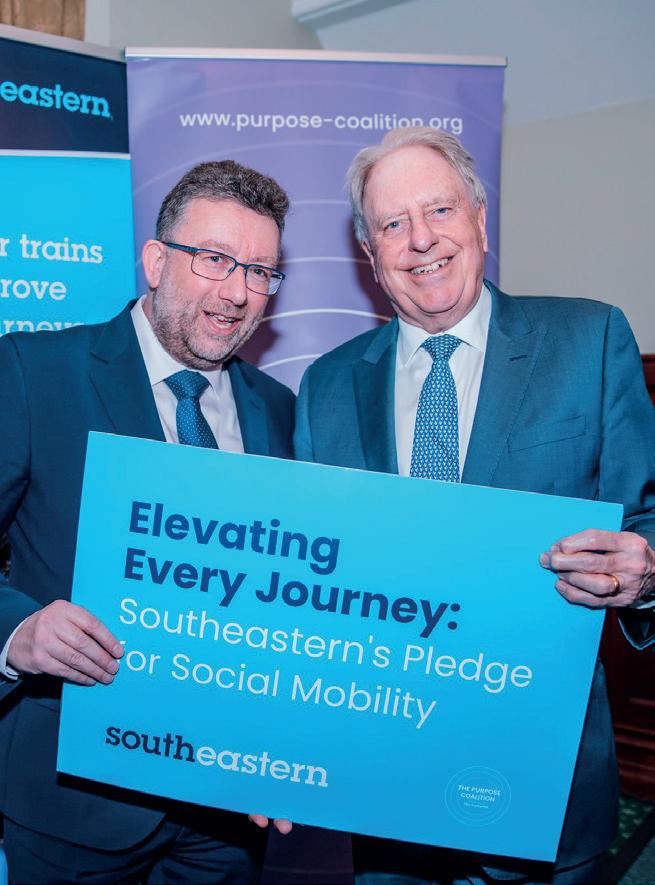
As a company, Southeastern is deeply committed to the wellbeing of its employees, customers and the communities it serves, and the report showcases the range of work it is already undertaking to support them.
It is building a pipeline of talent, ensuring that its staff have the hi-tech skills the industry needs with work placements, specialised apprenticeship programmes and a train driver pathway that recognises the importance of increased diversity in its organisation. It is also working hard to attract and retain more women into its workforce, including in management, through better career pathways and an improved health and wellbeing offering.
Southeastern is fully committed to building a better, more reliable and sustainable railway which supports the increasing number of customers who want to travel in an environmentally friendly way on an all-electric railway. Over 125 million journeys were made in the last year which is a year on year increase of 9%.
19 Fit for Purpose Magazine Southeastern Rail
As part of Southeastern’s commitment to exploring how it could extend its social impact, the report features a number of key recommendations for further action:
Industry leadership and advocacy on mental health, leveraging its position as an anchor institution in the communities it serves;
Enhance internal progression opportunities, with a specific focus on promoting gender diversity and embracing neurodiversity;
Amplify community impact by building an early talent pipeline through strategic outreach initiatives with schools, colleges, and further education institutions in areas of deprivation;
Regional leader on health and wellbeing in collaboration with other local partners.
Chair of the Purpose Coalition and former Transport Secretary, Rt Hon Justine Greening, said: “The rail sector is a great connector – of places, of people and of businesses. During my time in the Cabinet, and particularly when I was Transport Secretary, I saw first-hand how vital that connectivity was for economic growth. Southeastern recognises its potential as a force for good and has been very clear as a business that it is keen to extend this as far as possible, willing at every stage to measure and evaluate its progress. Our partnership has allowed us to explore the ways it can do that that will make a positive difference for its colleagues, its customers and its communities.

20 Fit for Purpose Magazine
Rail
Southeastern
We are fiercely committed to supporting the cities, towns and communities that we serve throughout south east London, Kent and East Sussex.
“It can be too easy to stereotype regions, with parts of the country being depicted as either wealthy or left behind. In fact, in almost all parts of the country, it is a much more complex picture, with areas of great deprivation running closely alongside areas of privilege.
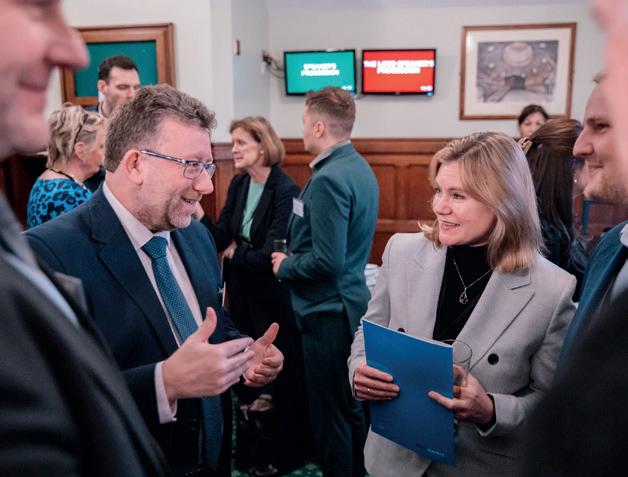
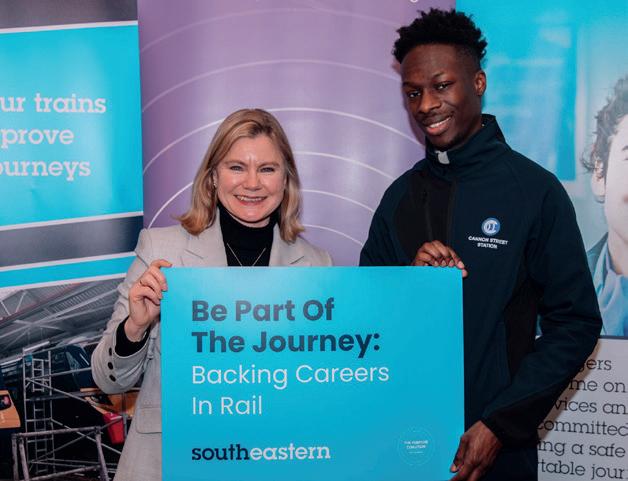
This report, and the recommendations for further action it contains, shows how effectively Southeastern has leant into the communities it serves to ensure that it continues to deliver opportunity as widely as possible, closely targeted to those who need it most.”
Steve White, Managing Director at Southeastern Railway said: “We are fiercely committed to supporting the cities, towns and communities that we serve throughout south east London, Kent and East Sussex.
We know railways are not just a means of travel, they can support economic investment, unlock growth and prosperity, and provide access to employment, education and training opportunities for millions of people.
That is why we are delighted to become the first UK rail operator to publish a Social Mobility Action Plan, clearly setting out our work to date as well as the future opportunities to do more.
This plan sits alongside our Social Value Report, which demonstrates the scale of our investment in the Southeastern region and the opportunities we are proud to provide to those who live and work here.
I would like to thank Justine and everyone at the Purpose Coalition for their help and support in bringing us to this stage and I look forward to working with them, and other like minded organisations, to do much more in the future.”
21 Fit for Purpose Magazine
Southeastern Rail
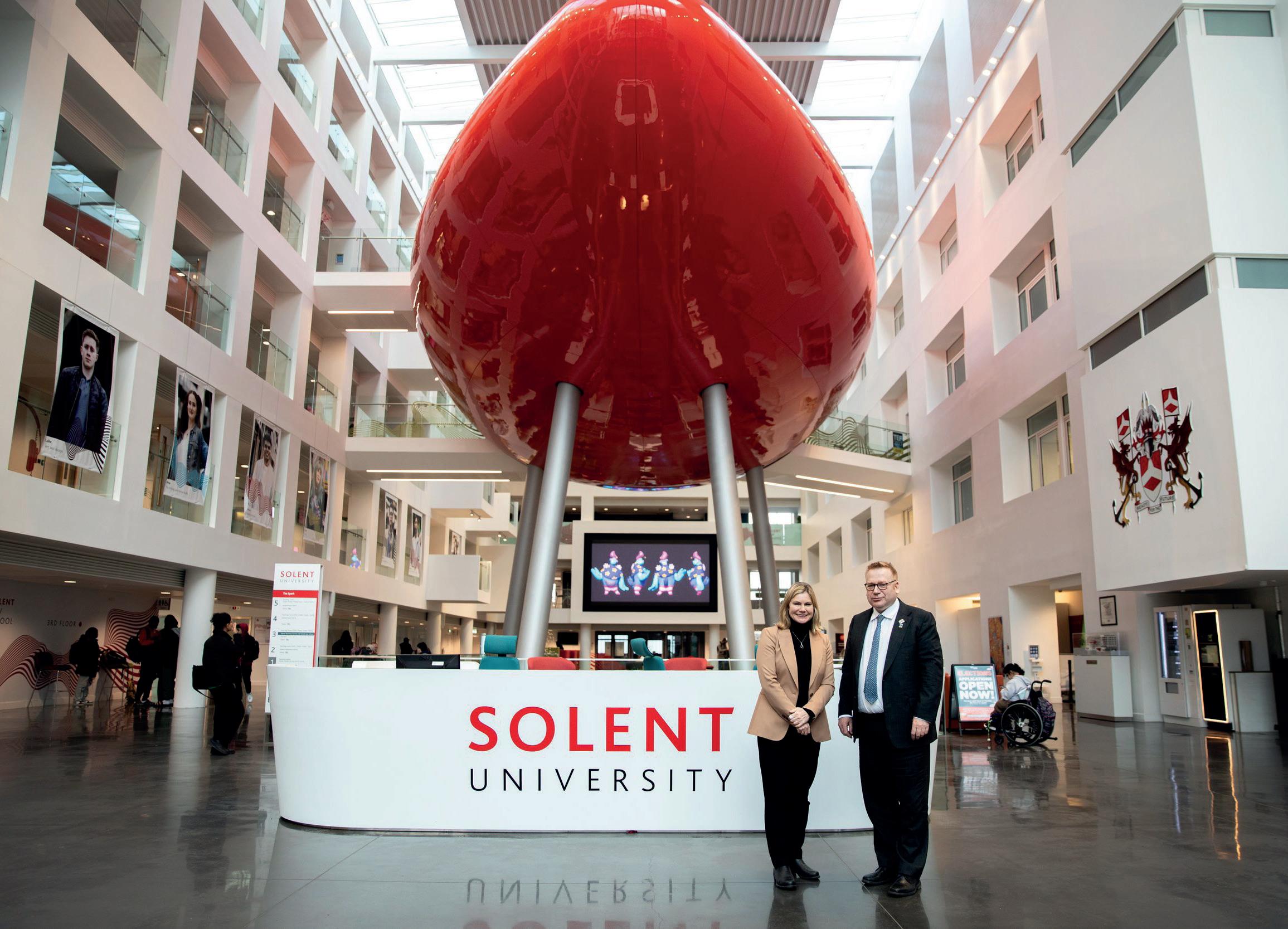
Universities as engines of social mobility:
Rt Hon Justine Greening leads Solent
discussion
Solent University, Southampton kicked off its Strategy 2035 development process with a guest lecture delivered by Rt Hon Justine Greening this week.
22 Fit for Purpose Magazine Solent University
Politicians must have a focus on higher education and the funding system, so that the sector can continue its crucial work on social mobility and driving opportunity.
The lecture series is designed to champion collaboration in the process of creating an informed strategy that responds to the opportunities and challenges facing modern universities today.
Rt Hon Justine Greening’s Universities as engines of social mobility and entrepreneurship looked at the role of the higher education sector and its importance to an incoming Government.
Solent’s Strategy 2035 Series will develop and inform the University’s next strategy. During this series stakeholders, staff and students are invited to explore the current landscape of higher education and consider opportunities for the future.
Rt Hon Justine Greening, Chair of the Purpose Coalition, says:
“As we head towards a general election, this is a crucial year for higher education. Politicians must have a focus on higher education and the funding system, so that the sector can continue its crucial work on social mobility and driving opportunity. It is imperative that the sector continues to break down barriers to opportunity through widening participation, student support, entrepreneurship and much more.
“Universities like Solent are great examples of higher education institutions that can provide the real-life solutions on social mobility that the UK so badly needs. I enjoyed kicking off the Strategy 2035 lecture series and meeting students, staff and local stakeholders.”
Solent’s Strategy 2035 Series invites staff, students and stakeholders to hear from experts in and out of the sector to discuss the future of higher education, the social landscape, rapid technological change, and opportunities for innovation and investment.
Vice-Chancellor, Professor James Knowles, says:
“Solent is a truly inclusive University that has a long history of ensuring access to higher education for all. Universities are at the height of their power when we work collaboratively to deliver the highest quality education that results in the very best outcomes for graduate futures. It’s my belief that this has a ripple effect, positively impacting regional economies and producing skilled graduates who are work-ready, confident about their future and prepared to become active and engaged citizens.
“This lecture series has been developed to put collaboration at the heart of our new strategy, and Rt Hon Justine Greening was the very best advocate to launch us into important conversations about how we respond effectively to the challenges and opportunities facing higher education.”
Solent is a truly inclusive University that has a long history of ensuring access to higher education for all.
23 Fit for Purpose Magazine Solent University

International Women’s Day 2024: How purpose inspires inclusion
The theme of this year’s International Women’s Day, Inspiring Inclusion, gets right to the heart of what it means to be a fair, equitable and thriving society.
Inclusion matters because it recognises the inherent value and potential of every individual. It creates an environment where everyone feels valued, respected
and supported and where everyone can flourish, regardless of gender, race, ethnicity, sexual orientation, religion or disability.
With a new report from the World Bank showing that no country in the world affords women the same opportunities as men in the workforce, it is clear that much work remains to be done to close the global gender gap. In this country we have seen significant progress but that should not allow us to become complacent. It’s up to each one of us to reflect on how we can contribute to inspiring inclusion in our own workplaces and communities and how we can confront the barriers that continue to get in the way of gender parity.
24 Fit for Purpose Magazine
The Rt Hon Justine Greening
Strive for a world where every woman is empowered and where diversity is not just accepted but celebrated.
During my time as Minister for Women and Equalities, I implemented our Gender Pay Gap legislation with crossparty support. It was more than just a policy initiative - it was a call for transparency, accountability and, ultimately, change. It was about shedding light on disparities and encouraging employers not only to acknowledge the gaps but to take meaningful steps towards bridging them. The legislation was a testament to our country’s commitment to gender equality, but it was also a clear acknowledgment that our work was far from over.
The Purpose Coalition is continuing that work, with leading employers in businesses, universities and healthcare organisations focusing on breaking down barriers to opportunity. Again, they are acknowledging the gaps but also sharing best practice and developing solutions to make life better for their customers, colleagues and communities. That can be the offer of flexible working so that women can work more easily alongside their family and caring responsibilities, management programmes that encourage them to progress within the organisation to the highest levels, mentoring and focus groups that facilitate conversation, advice and confidence. They map their work against a framework of 14 Purpose Goals which focus on the key barriers that prevent people from getting on, including Goal 14 which aims to achieve equality through diversity and inclusion. These purpose-led organisations recognise that fostering an inclusive environment is not just the right thing to do, it’s also crucial for driving innovation, understanding diverse customer bases and creating a workplace where everyone is able to contribute their best.
Inspiring inclusion in our communities is equally important. In education, for example, it is vital that we encourage women and girls to take up subjects that were traditionally male-dominated. Many of our business and higher education Coalition partners are doing great outreach work upstream in schools to inspire students to consider STEM subjects, to study them at university, to start businesses and to recognise that no career –whether train driver or engineer - is closed to them.
Our Coalition partners in health and social care are focused on reducing the health inequalities in areas such as neonatal care and the treatment of serious disease where disadvantaged women’s voices in particular are not always heard clearly and where they often experience worse outcomes as a result.
Genuine diversity and inclusion in the workplace leads to empowerment. It’s not just about having women on the team but about giving them the tools, opportunities and platforms to succeed and lead. It means breaking down the systemic barriers that have historically marginalised women to ensure that their voices are heard, their contributions valued and their rights protected.
Diversity enriches us by bringing together a multitude of perspectives, experiences, and ideas that are essential for innovation, empathy, and societal progress. More diverse companies avoid groupthink, make better decisions, are more effective at problem solving and are more profitable as a result. In short, it drives better outcomes for us all.
We should all be inspired by the theme of this year’s International Women’s Day to strive for a world where every woman is empowered and where diversity is not just accepted but celebrated. It should be a right afforded to all women, not just a privilege for some. Our collective efforts in fostering an inclusive society will pave the way for the next generation of leaders, innovators, and change-makers.
We should never assume that progress towards gender equality is inevitable. Each generation can move things forward, but it requires a renewed commitment, courage, and collaboration from all of us. That’s why International Women’s Day matters – it’s a chance for that renewed commitment. Standing together, we can continue to break barriers, challenge stereotypes, and build a world where everyone, regardless of gender, can achieve their fullest potential.
25 Fit for Purpose Magazine The Rt Hon Justine Greening
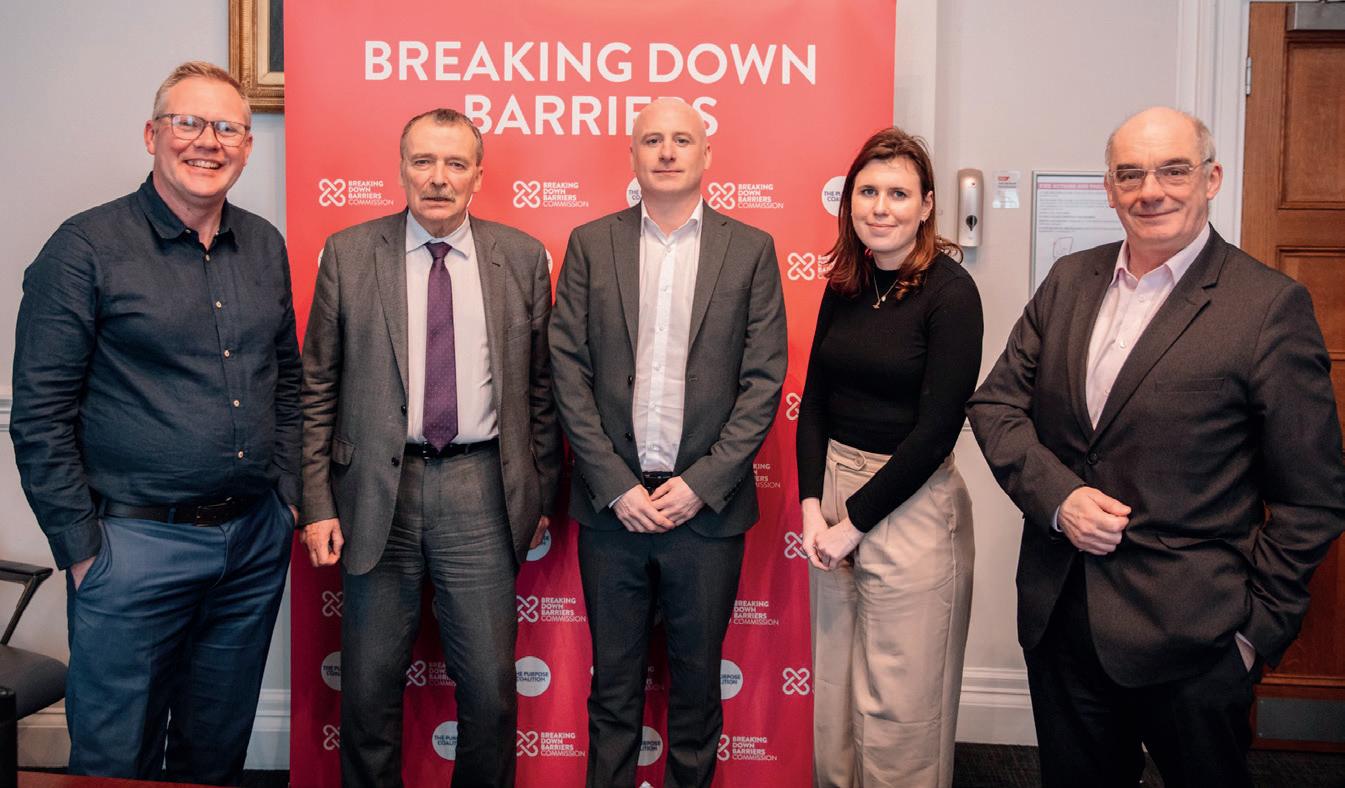
Shadow Energy Security Minister, Dr Alan Whitehead joins business and university leaders for Westminster Roundtable
Dr Alan Whitehead MP, Labour’s Shadow Minister for Energy Security has joined Purpose Coalition leaders Centrica, Leonardo and the University of Salford for a Westminster roundtable to explore the future of net-zero, skills and the just transition.
Dr Whitehead, the MP for Southampton Test, is an expert in energy policy, and has served as Labour’s Shadow Energy Minister since 2016. Prior to this, Alan was the Chair of PRASEG, the Associate Parliamentary Renewable and Sustainable Energy Group and Co-Chair of APSRG, the Associate Parliamentary Sustainable Resource Group. His special interests include further and higher education, local government, constitutional affairs, the environment, energy and transport policy.
The roundtable brought together a range of Purpose Coalition Members to explore the future of net-zero, and the Purpose Coalition’s ‘Harnessing the Energy Transition’ Purpose Goal.
26 Fit for Purpose Magazine The Purpose Coalition
One of Labour’s 5 Missions is to ‘Build a Clean Energy Superpower’, with a pledge to create a new, publicly owned energy company – Great British Energy. The event explored how the next Labour government can work with businesses committed to net-zero to deliver on it, the importance of a just transition to support communities across the UK, and how economic security and energy security go hand in hand, highlighted by the cost-of-living crisis.
Chair of the Roundtable and former Member of Keir Starmer’s Shadow Cabinet, Nick Forbes CBE, said: “It was great to welcome Alan to the roundtable on such a crucial issue for Britain, and to bring together our key Purpose Coalition Members for an in-depth discussion. Net-Zero will be a crucial area of focus for the next government, and it is vital that businesses, universities and government work together in order to deliver on it.”
Net-Zero will be a crucial area of focus for the next government.
The roundtable is part of a series of roundtables with Labour MPs and Shadow Ministers ahead of the next election on July 4th, including Alistair Strathern MP, Shadow Women and Equalities Minister Ashley Dalton MP, Shadow Legal Services Minister Alex Cunningham MP, Chair of the Business and Trade Select Committee Liam Byrne MP, housebuilding champion Andrew Western MP and many more.
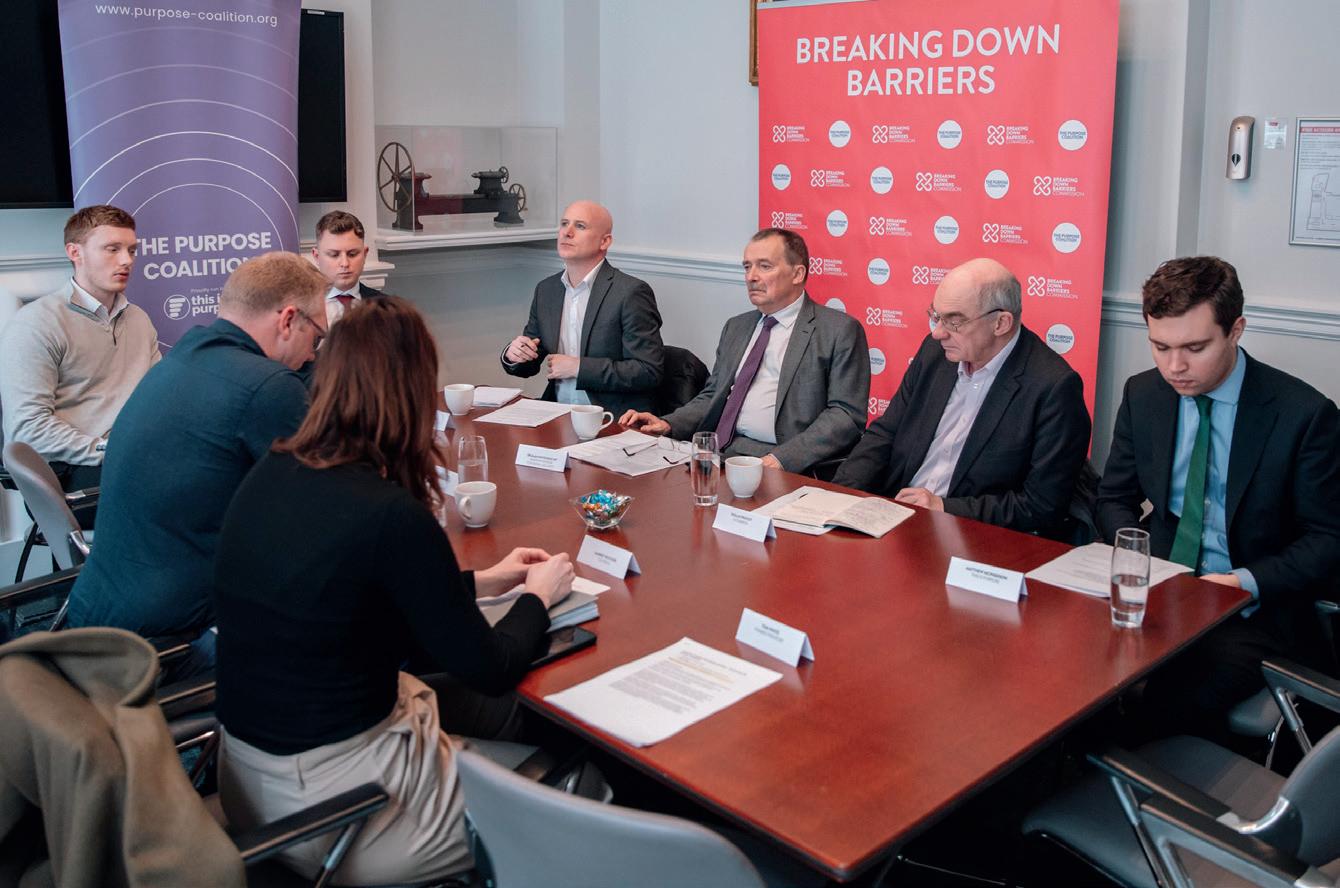
27 Fit for Purpose Magazine The Purpose Coalition
Labour’s answer to levelling up? Breaking down barriers
For someone who has been involved in Labour politics my whole life, I now feel a real excitement about the year ahead. There’s no complacency, but the Labour Party now has the best shot at returning to government for the first time in over a decade.
On election night in 2019 – when my party lost in communities that had voted Labour for decades – it was simply impossible to imagine we would be in this position today. In so many towns and cities across the UK, people felt forgotten and ignored by Labour in Westminster.
The promise to ‘level-up’ provided a message of hope, but five years on – the reality is that the promise of levelling up has not been fulfilled by the Conservative government.
But it is simply not good enough to say the government has failed on levelling up. My party needs answers too. So, what is Labour’s answer to levelling up?
Last year, Keir Starmer set out his five ‘Missions’ for government. Most of these are focused around clear, departmental-specific policy objectives – economic growth, health, green energy, and tackling crime.

The fifth and final Mission, however, is arguably the most important for a future Labour government – breaking down barriers.
Whilst my party has set out some clear, immediate objectives around this Mission to improve education, such as the vitally important pledge to put a specialist teacher in every classroom, I’d argue the Mission to break down the barriers to opportunity is the most radical. It will be the Labour Party’s answer to levelling up.
For a party founded out of the trade union movement –opportunity is everything.
Boris Johnson’s levelling up promises were explicitly designed to mean everything to everyone. People who voted Conservative for the first time in 2019 expected to see radical new investment in their local communities –new jobs, opportunities for young people, investment in roads and local transport infrastructure.
28 Fit for Purpose Magazine
Nick Forbes CBE
Breaking down barriers also means working in partnership with good business to secure good investment in local communities.
But five years on, that has – largely – not been delivered.
It isn’t good enough for the Labour Party to say the government has failed. My party needs practical, deliverable and yet equally radical ideas to deliver on the hopes of those who believed in levelling up in 2019.
So, for the next Labour government, it needs to focus on what really matters to people when it comes to breaking down barriers to opportunity. That means modern childcare, training and apprenticeship programmes for our young people, good upskilling, and progression opportunities – particularly for those who are at risk of being displaced by new technology.
The reality is that a Labour government will come to power with one of the toughest economic situations my party has faced since 1945. There simply won’t be the money available to invest in local communities.
Breaking down barriers also means working in partnership with good business to secure good investment in local communities. Doing so will take strong foundations and working with the best of British employers, underpinned by a growing and vibrant economy.
For my part, since stepping down, that’s what I’ve been doing, and it’s why today I am formally launching the Breaking Down Barriers Commission. The Commission, part of the Purpose Coalition, is working with progressive employers and innovative leaders including Curtins, Northern Gas Networks, Hitachi and more, to explore and consider their role in society.
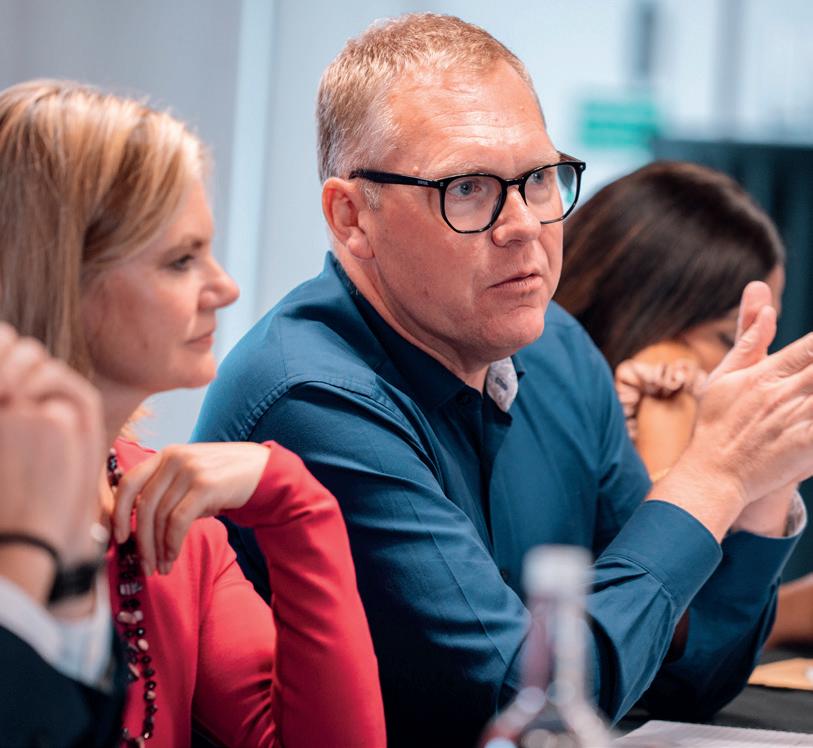
These organisations accept their duties as moral employers in society, but they also want and need a government they can work in partnership with –something that simply isn’t the case today.
If a Labour government wants to show how it can and is delivering on the promises made in 2019 to level up, it is going to require both investment in government to break down barriers to opportunity and working in close partnership with businesses and wider society to deliver the jobs, investment and opportunities people want to see.
These businesses accept their moral duties as employers in society, but also want to work in partnership with a government that provides the strong economic foundations to operate in.
The Labour Party that will be presented to voters this year is one that is radically different to that of 2019 –focused on the priorities of working people across the country. People in 2019 voted for levelling up, and by breaking down barriers to opportunity, the Labour Party must show how it is delivering on the hopes and aspirations of voters across the country.
29 Fit for Purpose Magazine Nick Forbes CBE
Breaking Down Barriers Commission and Curtins Announce Strategic Partnership
The Breaking Down Barriers Commission, a new initiative by the Purpose Coalition, has announced a new partnership with Curtins, a leading engineering consultancy, renowned for innovative solutions and commitment to sustainability.
The Commission is led by Nick Forbes CBE, a former Member of Keir Starmer’s Shadow Cabinet. The Commission is now shaping the role businesses and organisations can play as responsible parts of society committed to breaking down barriers to opportunity for their customers, colleagues and communities.
The collaboration aims to leverage Curtins’ expertise in engineering and sustainable design to support the Commission’s mission of shaping the role businesses and organisations can play as responsible parts of society committed to breaking down barriers to opportunity for their customers, colleagues and communities. The collaboration will focus on innovative strategies to remove systemic barriers that prevent individuals from reaching their full potential, regardless of their background or circumstances.
The Commission is part of the wider Purpose Coalition, made up of organisations who are working to break down barriers to opportunity. With a general election taking place on July 4th, the Commission seeks to showcase the role of the best of British business in breaking down the barriers to opportunity. The Coalition includes some Britain’s biggest names including the BBC, UK Power Networks, bp, Virgin Money, Co-op Group, Travelodge, Centrica, Leonardo, Sodexo, Pennon Group, Channel 4, The Wise Group, Pertemps, Hitachi, Reed, Royal Mail, E.ON, NHS Trusts, Councils and Universities amongst others.
Nick Forbes CBE, Chair of the Breaking Down Barriers Commission and former Member of Keir Starmer’s Shadow Cabinet, said:
“We are at a pivotal moment where collaboration between public initiatives and private enterprises can yield transformative results for our communities. The alliance with Curtins represents a significant step forward in our quest to dismantle societal barriers. Their exceptional track record in engineering and dedication to sustainable development aligns perfectly with our vision of creating spaces that everyone can access and enjoy, regardless of their physical abilities or socio-economic backgrounds. Together, we are setting a new standard for how industries can contribute to a more inclusive society.”
Rhiannon Carss, Board Director at Curtins said:
“The positive impact that we can have on the world around us – be that on individuals, on industry, or on the wider planet – it’s at the very heart of what we do, and it’s nothing new to us. Having the opportunity to work with other like-minded businesses; to share good practice, learn from each other and together generate new ideas too is hugely exciting. We’re looking forward to getting stuck in and being part of a collective voice that champions business as a force for good.”
In this vital General Election year, the partnership is not just about making commitments, but taking concrete actions to improve lives for customers, colleagues and communities.
30 Fit for Purpose Magazine Curtins
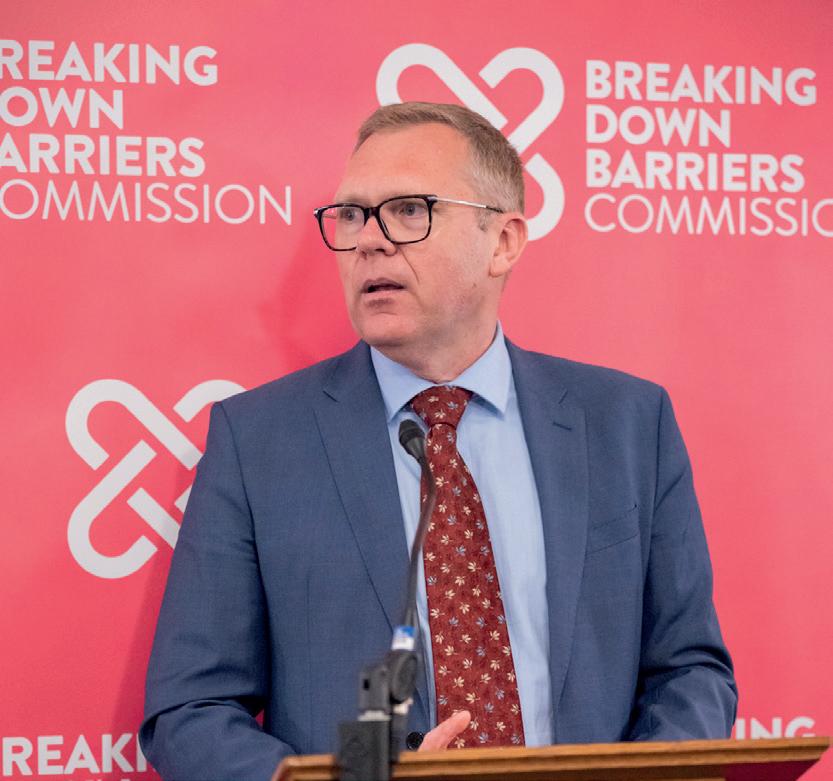
ROAD TO THE GENERAL ELECTION
Starting 28th May
JOIN NICK FORBES CBE former Member of Keir Starmer’s Shadow Cabinet and Director of External Affairs
MATTHEW MCPHERSON for a weekly virtual webinar covering insights and policy developments in this crucial General Election campaign.
ELECTION 4th July

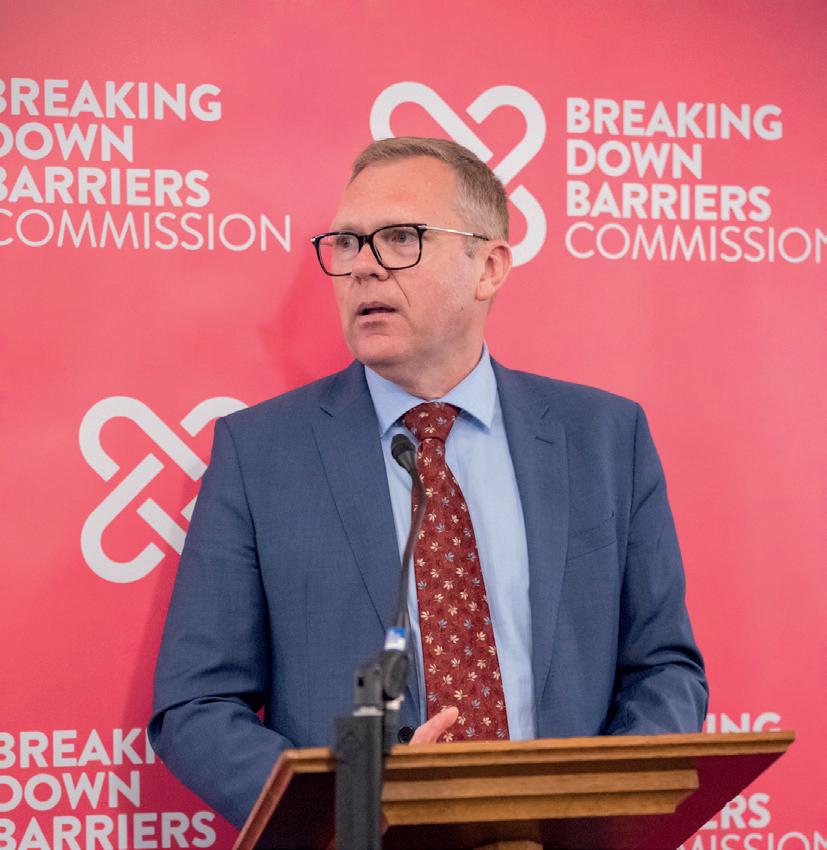
Monday 10th June 1pm - 2pm
Monday 17th June 1pm - 2pm
Monday 24th June 1pm - 2pm
Monday 1st July 1pm - 2pm
Each session takes place virtually, and you don’t need to attend every session. Feel free to share the invitation around your organisation
fit-for-purpose.org/election or ask your coalition director SIGN UP AT
GENERAL
Access to care is a major barrier to good health and wellbeing
The link between poverty and ill-health is widely recognised. Recent research from the Institute for Public Policy and Research (IPPR) described “bad health black spots” where there was a direct correlation between deprivation and poor health.
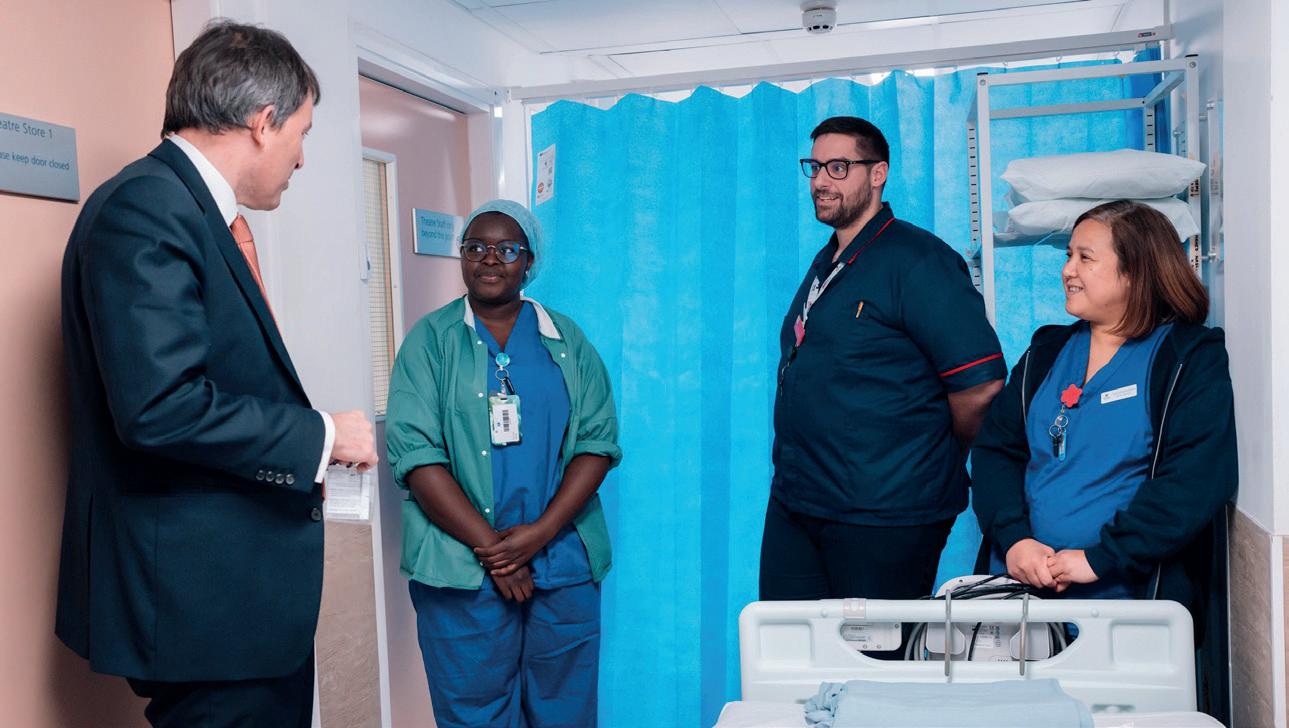
So, a survey by Healthwatch England which has found that poorer people find it much harder to access NHS care when they are experiencing ill-health than those who are well-off and have a worse experience when they do get it, should concern everyone who is committed to reducing health inequality.
The survey found that 42 per cent of respondents who described their situation as ‘really struggling’ said they had trouble getting to see a GP, double the percentage of those who were ‘very comfortable’. The worst off
also found it difficult to get NHS dental care38 per cent compared to 20 per cent. Accessing mental health treatment was difficult for 28 per cent of the very poor, compared to just nine per cent of the very comfortable. There was also a gap in A & E care, with 26 per cent of poorer people saying they found it hard to obtain compared with 19 per cent of those who were comfortable. Overall, 19 per cent of those on very low incomes reported difficulty accessing NHS care, compared to eight per cent of the well-off.
32 Fit for Purpose Magazine Mark Hulsmeier
The experiences of the least well-off once they saw a health professional were also different to those who were financially comfortable. Twenty-one per cent of the really struggling felt they were not listened to by the last health professional they saw, compared to just seven per cent of the better-off. Twice as many poorer people felt that the person they saw last did not involve them in decisions about their care.
Poorer people can face challenges in taking unpaid time off work, the expense of travelling to appointments and the stigmatisation of poverty, all of which play their part in worse experiences of healthcare.
Although GPs’ increased workloads mean that many people find it difficult to access a doctor’s appointment, it is the poorest who are being disproportionately affected. Healthcare professionals also acknowledge that people from deprived backgrounds often need longer than the standard 10-minute GP appointment because of the impact of poverty on both their physical and mental health.
Breaking down these barriers to good health and wellbeing is crucial to levelling up health inequalities for a fairer – and more prosperous - society. That includes making sure that NHS services are accessible for everyone, especially the most vulnerable. It is the focus of all Purpose Health Coalition partners.
South Warwickshire University NHS Foundation Trust’s work is centred on addressing societal inequalities and changing behaviours in the communities it serves, spanning school years, post-16, working age and retirement. Its Stop Smoking in Pregnancy initiative, infant feeding service and nutrition programmes include opportunities for volunteers who can go on to take up permanent roles with the Trust. Its uses technology to deliver virtual outpatient activity and mental health support, developing initiatives to help the care and management of chronic conditions, including remote monitoring for patients with diabetes. Its partnership with Warwick Business School monitors the effectiveness of its innovations in care and assesses if they can be accessed equally by those from different backgrounds.

Kent and Medway NHS and Social Care Partnership Trust focuses on the mental care of its communities in one of the most deprived areas of the country. It recognises that digital inclusion and accessibility are key to reaching those people who need support the most. It has improved its website accessibility and provided digital resources to ensure that its services are available to everyone, regardless of ability or technology usage, to reach as wide an audience as possible. Its work with the Purpose Coalition has encouraged it to go even further, tracking and measuring its work and developing new strategic partnerships with other organisations that will benefit the local community.
As a rural hospital with a large catchment area, Airedale NHS Foundation Trust operates with a high degree of community engagement to deliver the quality of care that leads to healthier communities. It aims to develop a more personalised approach to care as part of its integrated and community offer that is available at the right time in the right place for all patients, focusing on self-care and prevention and ensuring that it meets its population’s needs.
Access to healthcare is one of the key social determinants of health. Being able to access NHS care when and where it is needed, and feeling that their voice is heard, is crucial for disadvantaged communities to facilitate the better health and wellbeing that will allow them to take advantage of opportunity. Poor access presents barriers that impact educational attainment, choice of job, earnings, financial stability and retirement age. That is a loss for the individual but also for the economy which can only grow effectively if it makes use of all the talent that exists across the country.
33 Fit for Purpose Magazine Mark Hulsmeier
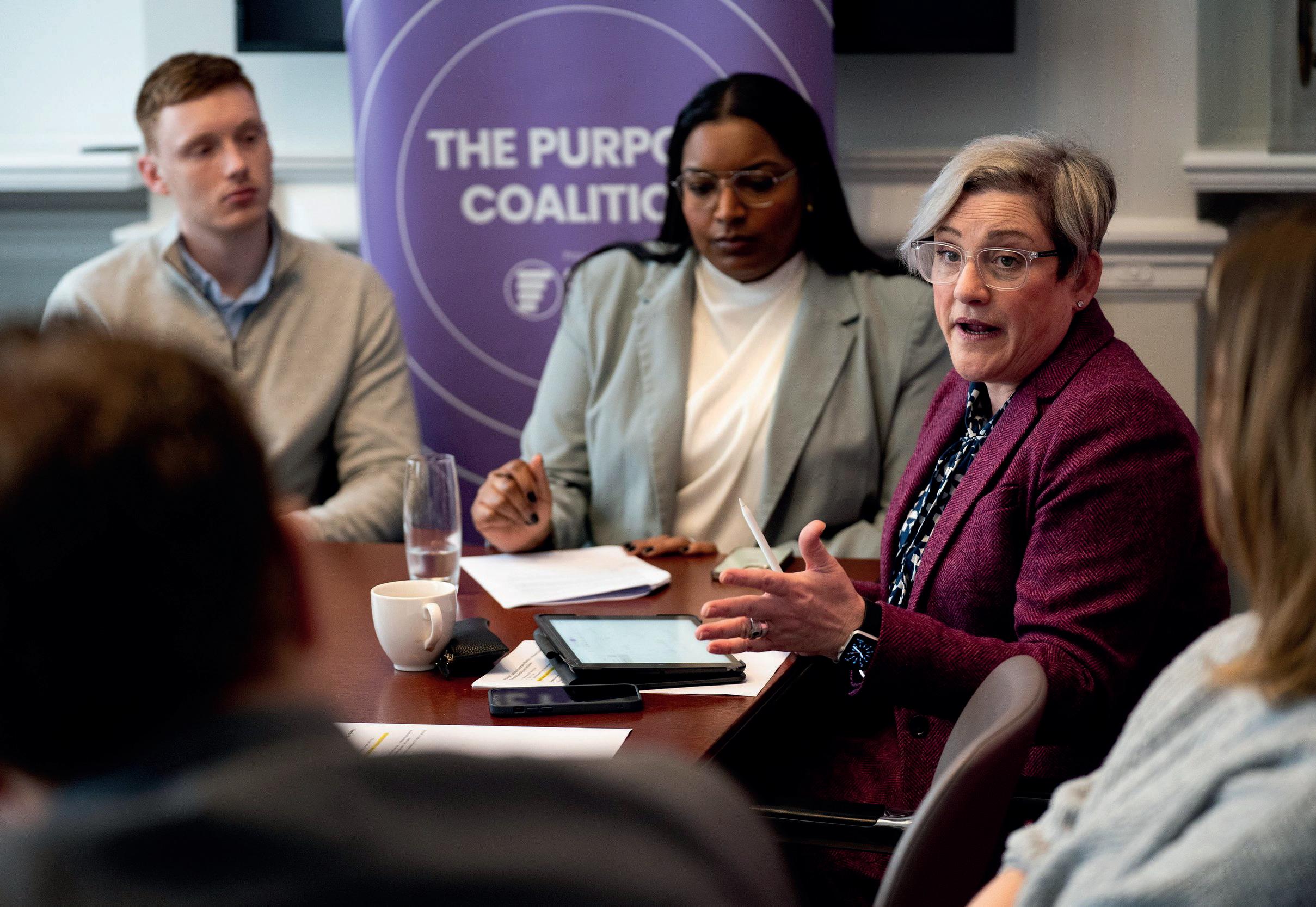
How a Labour government can drive business success through diversity and inclusion
Shadow Women and Equalities Minister, Ashley Dalton MP joins leading businesses and universities for Westminster roundtable.
34 Fit for Purpose Magazine The Purpose Coalition
Diversity and inclusion under a Labour government were the focus of a roundtable held in Westminster today with Ashley Dalton MP, Shadow Minister for Women and Equalities.
The event was chaired by Nick Forbes CBE, former member of Sir Keir Starmer’s Shadow Cabinet, who was joined by a range of FTSE 100 business and university Purpose Coalition partners including the Coop Group, Centrica, Aldermore Bank, the University of Greenwich and the University of West London.
A lack of equality, diversity and inclusion in the workplace is one of the major barriers to opportunity and is the focus of Purpose Goal 14. The roundtable explored three key areas: How the next Labour government could work with employers to improve diversity and inclusion in the workplace?
Why unlocking equality and diversity in the workplace is vital to boosting economic growth and unlocking people’s full potential.
Why organisations need to tackle socio-economic discrimination in the workplace as part of their diversity and inclusion strategy.
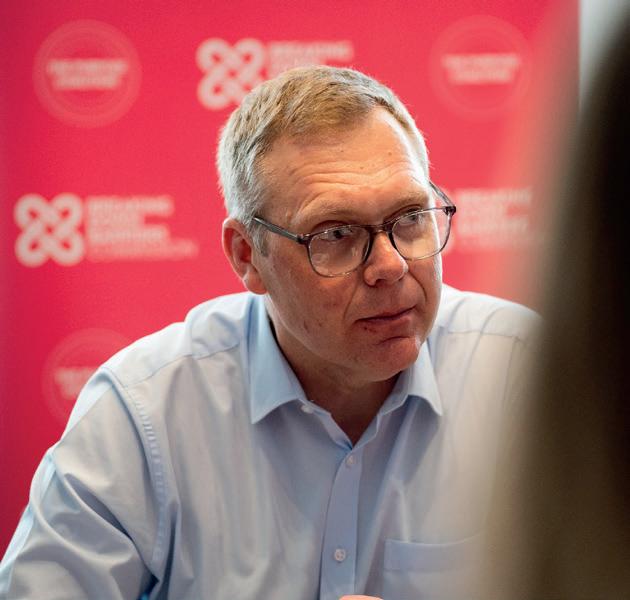
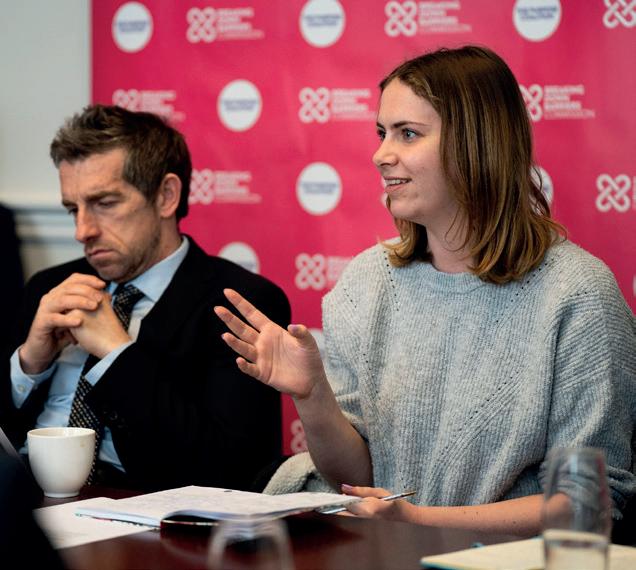
Ashley, appointed Shadow Women and Equalities Minister last year, is working closely with Shadow Secretary of State Anneliese Dodds to develop the Labour Party’s programme for equality, diversity and inclusion in government.
Engagement Director at the Purpose Coalition, Nick Forbes CBE, said:
“Diversity and inclusion is key to successful, purposeled companies. Research shows us that more diverse companies make better decisions – and are more profitable - because they have a wider perspective and avoid groupthink. There has been significant progress on opening up opportunities for women and for ethnic minorities but there is still a long way to go. Diversity is not just about gender and ethnicity. It extends to sexuality, disability and other challenges that can lead to specific groups missing out on opportunity.
“It is crucial that every organisation considers how it can attract underrepresented groups and how they can be supported to flourish – not just to get in but to get on and be themselves. As importantly, they should be measuring outcomes to enable them to monitor their progress effectively. This roundtable has enabled us to share best practice and develop ideas on how a Labour government can work with employers to ensure that they are tapping into all the talent that exists in the areas they serve.”
35 Fit for Purpose Magazine The Purpose Coalition
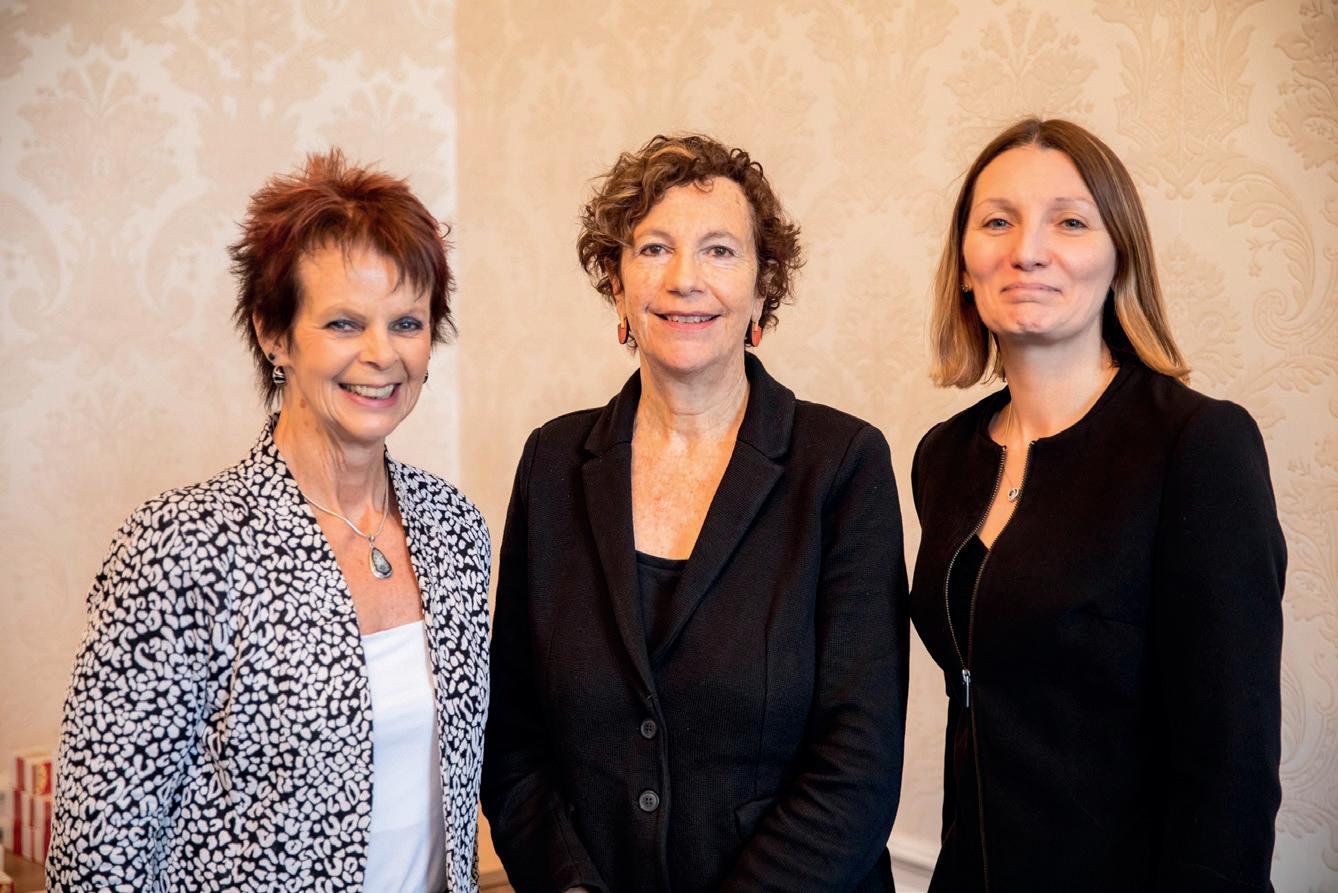
Kent and Medway NHS Foundation Trust confirms its social impact commitment
Leading mental health provider, Kent and Medway NHS Foundation Trust (KMPT), has marked a new stage in its social impact journey.
The Trust has been working with the Purpose Health and Social Care Coalition to develop an Impact Report, examining what it is already doing to tackle equality of opportunity and exploring where it can go even further. It is the largest provider of mental health care across the region, offering specialist services in Sussex, Surrey and beyond in diverse communities across rural and urban areas which include some of the most deprived in the UK.
36 Fit for Purpose Magazine Kent & Medway NHS Foundation Trust
it is committed to delivering social value, guided by its vision is to provide outstanding care and to work in partnership to deliver this in the right place, for every service user, every time.
It is also the largest employer in the region, with a workforce of over 3,500 people from 66 nationalities. As an anchor institution, it is committed to delivering social value, guided by its vision to provide outstanding care and to work in partnership to deliver this in the right place, for every service user, every time.
The Report maps KMPT’s activities across 14 Purpose Goals which correlate with the barriers that can prevent equality of opportunity, from early years to digital inclusion and from positive destinations post-16 to sustainable communities. Its focus is on Goal 8 Good Health and Wellbeing but the good practice the report features also highlights that it has a much wider reach - investing in youth, promoting inclusivity and diversity, prioritising workforce wellbeing, addressing digital inclusion, and championing equality and diversity.
The Report also identifies areas where the Trust can make even more of an impact on its colleagues, its patients and the wider communities it serves: Measuring socioeconomic background to gain a wider understanding of the organisation’s diversity and identify progression challenges;
Scaling up outreach activities through strategic community assessment to target those in most need;
Leading the supply chain through social value-based procurement, reframing its relationship with suppliers and businesses;
Forging a regional partnership with fellow Purpose Coalition member, Southeastern Railway, to pioneer an innovative approach to mental health provision and community engagement.
KMPT is continuing to work with the Purpose Health and Social Care Coalition and has already initiated work on some of these recommendations.
Presenting the Impact Report to KMPT’s Board, Purpose Health & Social Care Director and former Public Health Minister, Rt Hon Anne Milton, said:
”It was fantastic to speak at the Kent and Medway NHS and Social Care Partnership Trust today. I am very impressed with all they have achieved and it was a great opportunity to talk about their impact report. We talked through some of their recommendations and where they see some of the next steps for them will be.”
KMPT Chief Executive Sheila Stenson said: “This report is just the start of our social impact journey. One in four of us will experience poor mental health at some point in our lives; we are confident we can go beyond our ‘day job’ and use our position and affiliation with the Purpose Health and Social Care Coalition to do more.
“As we continue to care for more people in the local community, and address key issues impacting them, we are even better placed to help people live well and address regional imbalances.”
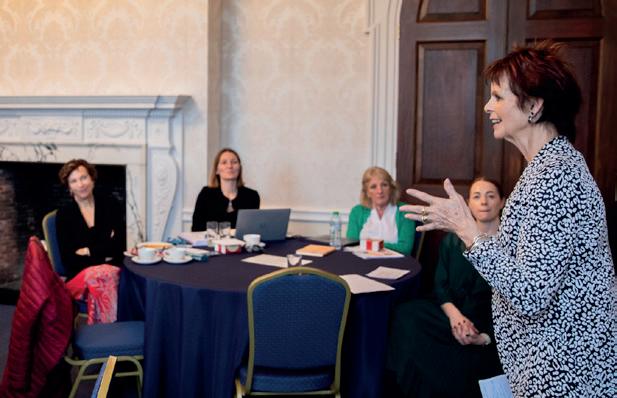
37 Fit for Purpose Magazine Kent & Medway NHS Foundation Trust
Keri Purdy – Such an inspiration !
Keri Purdy has been part of Ramsay Health Care UK for over 16 years, starting her career at Park Hill Hospital in Doncaster as a newly qualified nurse in 2008.
After relocating to the North East, Keri asked to be transferred to another Ramsay Hospital and joined the Tees Valley Treatment Centre in Middlesbrough. In 2018, the Treatment Centre relocated to a purpose built day case hospital on the grounds of Acklam Hall now known as Tees Valley Hospital.
Keri’s development within Ramsay has been a very positive experience starting from a newly quallified nurse, to senior staff nurse and then to Outpatient Manager. In 2021, Keri moved into the role of Ward Manager of Tees Valley hospital and has been instrumental in the establishment and success of the hospital today.
In January 2023, Keri started to feel unwell and sought support from her local GP. Unfortunately, Keri was diagnosed with a type of brain tumour known as craniopharyngioma resulting in a number of surgeries.
During her treatment Keri was told that the operations may change her personality and could result in her needing 24 hour care. The surgery was successful, and working hard through her rehabilitation programme, Keri was welcomed back into Tees Valley in February 2024 on a phased programme to get her back into the workplace.
Keri says, “The team at Tees Valley Hospital have been very supportive in my recovery and I was sent some lovely messages and received visits while I was recovering. Donna Thornton, our Hospital Director, kept in close contact with my partner Chris and mum Helen and built a great relationship with them during the last 18 months. I am so grateful for the friendship, support and understanding while I was recovering and knowing that my role was waiting for me when I was ready to return was a great peace of mind and one less thing to worry about.”
“Since coming back to work my health has continued to improve and I am now back to working 12 hour shifts.
I am classed as being disabled as I have lost sight in one eye, but this has been such a positive result considering I may not have ever been able to return to work and the possibility of needing 24 hour care. With all of the support I am so proud of where I have come and I’m over the moon to be back at work”
Business Relations Manager Kellie Joyce said “I am so proud of Keri’s positivity and I’m over the moon she is doing so well. This has been such an inspiring story and our patients also agree. I have included some of the positive feedback received about Keri which speaks wonders on how she is an integral part of the Tees Valley family. We are so pleased to see her go from strength to strength”
Head of Clinical Services, Karen Blakemore said “We are delighted to have Keri back to work. Her dedication and enthusiasm are second to none. Keri is an inspiration to us all at Tees Valley Hospital, and we’re incredibly proud of how Keri has overcome what has been a very challenging year for her.”
A snippet of patient feedback about Keri
From start to finish I was made to feel at ease and everyone was fantastic and so caring. Special mention to Victoria and Keri who deserve so much credit.
Keri was brilliant!
Keri was friendly and caring and thorough. Very informative too
Very supportive staff on check-in and Keri was lovely and helpful in recovery
38 Fit for Purpose Magazine Ramsay Healthcare UK
Embracing Starting Fresh
In today’s rapidly evolving job market, the challenge of filling over a million vacancies across the UK requires innovative and inclusive strategies.

It’s time we broaden our horizons and tap into a pool of talent that is often overlooked due to historical stigmas - individuals with criminal convictions. The recent launch of Sodexo’s Starting Fresh Employer Toolkit is not just a step in the right direction, it’s a leap towards transforming societal misconceptions and unlocking potential within our communities.
The toolkit is a testament to the fact that people with criminal convictions can, and do, make valuable contributions to businesses across a spectrum of industries. From construction to hospitality, and from hairdressing to IT services, these individuals often possess the skills, qualifications, and work ethic that employers are desperately seeking.
But why should your business consider this untapped talent pool? The benefits extend far beyond filling immediate vacancies and breaking down barriers. Employing individuals with past convictions is an
opportunity to foster diversity, innovation, and resilience within your teams. Diversity in experience brings diversity in thought, driving innovation and competitive advantage.
Addressing concerns about risk and suitability is crucial. The toolkit demystifies the process, highlighting that many roles do not require DBS checks and that risk assessments can be tailored to specific job requirements. Initiatives like ‘Ban the Box’ encourage employers to focus on a candidate’s current skills and potential, rather than past mistakes.
The evidence is clear. Employment significantly reduces the likelihood of reoffending. By providing opportunities to those with criminal convictions, businesses play a pivotal role in supporting their reintegration into society. This not only helps in reducing the cycle of reoffending but also contributes to building safer communities.
Engaging with this underutilised talent pool also addresses the practical challenges of recruitment and retention faced by many sectors. With support from organisations like Sodexo, and the guidance provided in the Starting Fresh Employer Toolkit, businesses can navigate the recruitment process, access skilled candidates, and contribute to meaningful social change.
As business leaders, we must challenge our preconceptions and recognise the mutual benefits of inclusive hiring practices. The Starting Fresh Employer Toolkit offers a comprehensive guide to understanding and embracing this opportunity. It’s more than a resource; it’s a catalyst for change.
39 Fit for Purpose Magazine The Rt Hon Justine Greening

Julian Sturdy MP visits Clifton Park Hospital in York to see
‘People
Caring for People’ in action
York Outer Conservative MP, Julian Sturdy has visited Clifton Park Hospital to meet local doctors, nurses and wider staff working at the hospital.
40 Fit for Purpose Magazine Ramsay Health Care UK
It was a great opportunity to be able to introduce Julian to our team and to hear directly from them about our work.
Mr. Sturdy was given a tour of the hospital by Sandra Donoghue, Hospital Director and Head of Clinical Services, Holly Kitching, learning more about the services the hospital delivers to patients across York and North Yorkshire. Clifton Park Hospital offers a range of services covering orthopaedic care, diagnostics and treatment for ear, nose and throat disorders.
Clifton Park Hospital is part of Ramsay Health Care UK, one of the leading independent healthcare providers operating 34 hospitals across the UK. Clifton Park Hospital has built an excellent reputation for delivering high quality healthcare for NHS patients, as well as those using private healthcare insurance or those who choose to self-fund their care.
In late 2022, the hospital installed a new, state-ofthe-art MRI scanner as part of a £1.6m investment, providing high quality and expertly reported imaging to both NHS and private patients alike.
During his visit, the local MP had the opportunity to learn more about the long-established relationship between the hospital and York and Scarborough Teaching Hospitals NHS Foundation Trust, where a sub-contract is in place for Clifton Park Hospital to deliver elective healthcare services in the locality. The relationship aims to improve the provision of services to the wider health community, including reducing both surgical and diagnostic NHS waiting times.
During his time at the hospital, Mr. Sturdy visited the 24-bed inpatient ward, theatre suite and ambulatory care unit.
Clifton Park Hospital Director, Sandra Donoghue said: “It was brilliant to welcome Julian back to Clifton Park Hospital to showcase our work as part of the wider health community, delivering vital care to patients, when they need it.
Working in partnership with our local NHS, Clifton Park Hospital plays a vital role in delivering care for patients in York and across North Yorkshire. It was a great opportunity to be able to introduce Julian to our team and to hear directly from them about our work.”
Julian Sturdy MP, Member of Parliament for York Outer said: “As ever, it was fantastic to meet the dedicated teams at Clifton Park Hospital who are working alongside the NHS to help drive down waiting lists for the fourth consecutive month.
I was interested to hear the full range of tests and scans that they offer with capacity to see more patients. I will be writing to the ICB to ensure that patients on waiting lists are offered treatment at Clifton Park Hospital as part of their NHS care.”
Clifton Park Hospital is a joint venture comprising Ramsay Health Care UK (RHCUK) and North Yorkshire Orthopaedics Surgeons (NYOS) Ltd. The partnership aims to ensure patients can expect the best care, delivered safely and efficiently in a modern, clean, well-maintained environment.
41 Fit for Purpose Magazine Ramsay Health Care UK
Partnerships will provide the impetus for a successful energy transition
Developing new solutions, and sharing best practice, will be key to managing the energy transition successfully. It is increasingly looking like that transition will be shaped by a Labour government.
Over the last few months, the Purpose Coalition has been holding a series of meetings for its partners –businesses, universities and NHS Trusts and healthcare organisations - to explore how the Labour Party can work with them on the Five Missions which will form the backbone of its manifesto and drive forward its work in government. One of those missions is to ‘Build a Clean Energy Superpower’, with a commitment to create a new, publicly owned energy company – Great British Energy.
I recently chaired a roundtable in Westminster for Purpose Coalition business and university leaders with the Shadow Minister for Energy Security, Dr Alan Whitehead MP. An expert in energy policy, he explored the ways in which a Labour government can work with businesses on the future of net zero and green skills to ensure that the energy transition is delivered effectively and fairly to communities across the country.
The pandemic, followed closely by geo-political unrest, led to huge societal and economic uncertainty. Energy insecurity was perhaps one of the highest prices we paid in this country, amid a cost-of-living crisis that is still impacting many. These ongoing challenges highlighted how it is almost always the most vulnerable and the
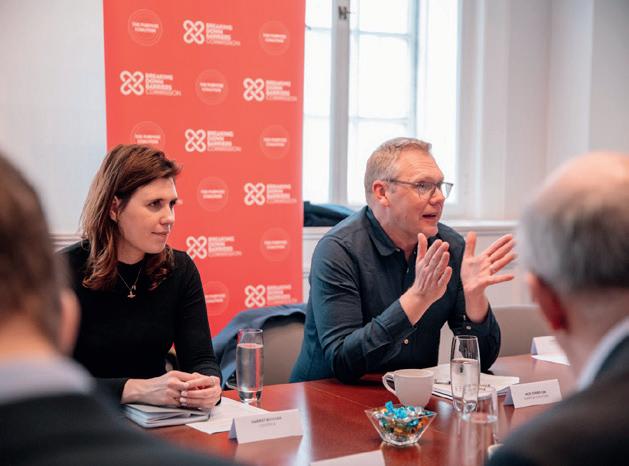
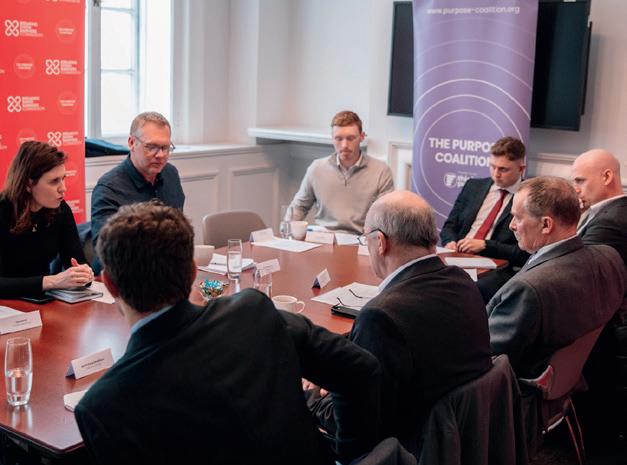
42 Fit for Purpose Magazine Nick Forbes CBE
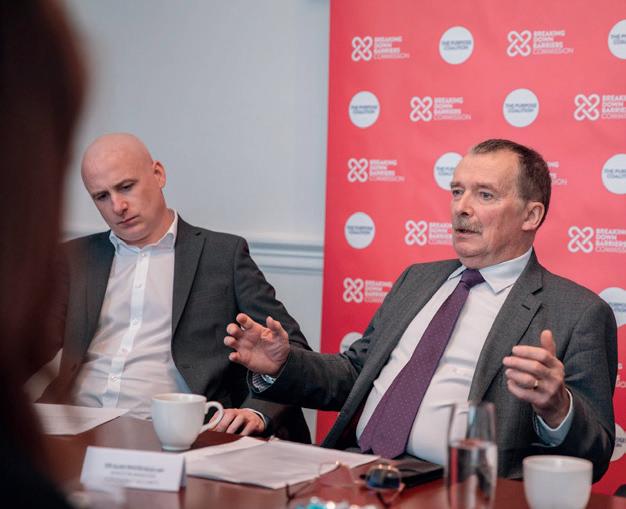
least financially resilient who are hit the hardest. Government and business need to be prepared to learn lessons from those experiences when they are developing plans for the transition to net zero to make sure that it works for everyone.
Local partnerships can make powerful contributions based on their individual expertise and knowledge of local communities and resources and will be key to taking effective action. As one example, building on their world-leading research and development facilities, three North East universities - all Coalition partners - recently announced plans to expand their work to advance renewable energy technologies. Investment in renewable energy is essential for the country, providing increased energy security and critically important additions in electricity capacity to meet domestic and industrial demands.
An award of £5.3 million from the Engineering and Physical Sciences Research Council will allow Northumbria, Newcastle and Durham Universities to develop ReNU, their successful Centre for Doctoral Training in renewable energies. Additional contributions from partner universities and companies will boost total funding to nearly £11.5 million. The project will create RENU+ – the ESPRC Centre for Doctoral Training in Renewable Energy Northeast Universities Plus – to help the UK government progress towards its net zero aims for a low carbon economy.
This programme has a different focus from other renewable energy projects in that it has a clear emphasis on social mobility. Acknowledging that achieving net zero is a society-wide problem, it is adopting an inclusive approach. It will focus on equality, diversity and inclusion by widening access to doctoral level training to those with non-traditional educational backgrounds and encouraging those in under-represented groups such as the unemployed or disabled, carers and military veterans to train as doctoral carbon champions.
The programme aims to create future leaders in the next generation of researchers, specialists and industry experts across a wide range of sectors and industries. It will offer direct sponsorship of doctoral research projects and the delivery of a high-skill training programme. The universities expect to train more than 50 additional doctoral carbon champions through RENU+ over the next eight years, with the first cohort of students expected to enrol in 2025.
The universities will work closely with key partners across local government, industry and charities, including Northumbrian Water, SSE, Port of Tyne, the NHS, Newcastle City Council and North of Tyne Combined Authority.
It is a positive example of local partnerships championing their local area, playing to their strengths while also building a resilient, efficient and sustainable energy system. These North East universities have a history of collaborative projects which not only offer a wide range of opportunities for their local communities but are also powerful engines for regional and national growth. Programmes such as RENU+ will help shape a fair and sustainable energy transition that is also an inclusive one.
These North East universities have a history of collaborative projects
43 Fit for Purpose Magazine Nick Forbes CBE
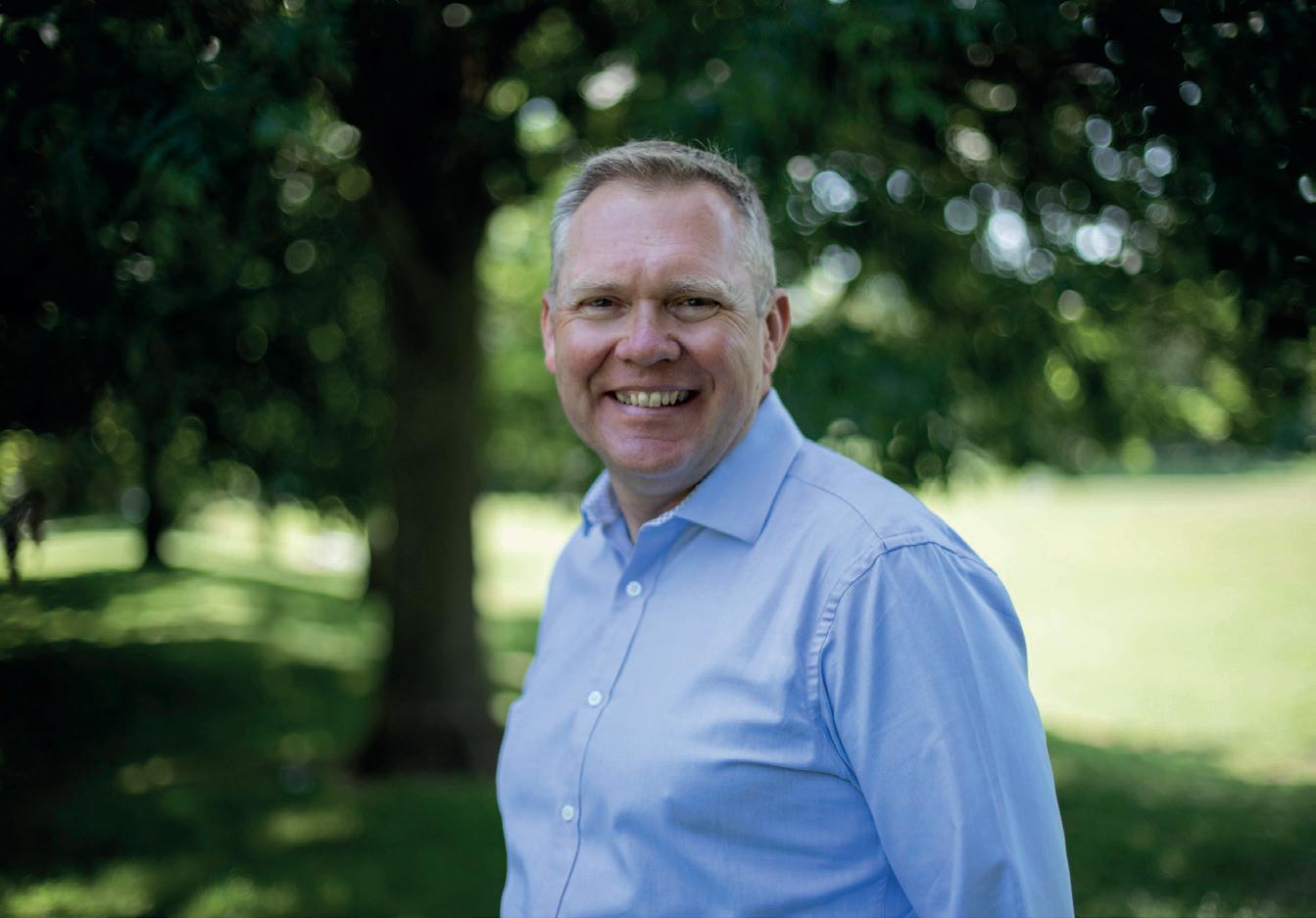
Multiplying opportunity –how learning maths as an adult in Essex is adding up
Ensuring that everyone can make the most of their potential means ensuring that people have the basic skills that will help them take advantage of any opportunity that comes their way.
44 Fit for Purpose Magazine Nick Forbes CBE
Upskilling isn’t just about equipping people with highly technical expertise. It’s also about providing basic skills such as maths and literacy that can be applied in every part of their lives.
For many reasons, some people miss out on learning these skills at school, struggling to see the relevance of what they are learning, especially when it comes to maths. They reach adulthood unable to work with numbers, either in their everyday or working lives. That can create huge obstacles as they struggle with household finances, helping their own children at school or getting and progressing in a job. It can be a significant barrier to opportunity throughout their lives.
In Essex, adult numeracy is lower than the national average. That is a barrier for those individuals but also a barrier for the broader growth prospects of the county. Essex County Council are meeting the challenge head on with a free maths programme, Multiply, that is aimed at preventing age being a barrier to opportunity. It is available to residents aged 19 and over who do not have a level 2 qualification in Maths (GSCE/O Level) C or above. Many of those who participate in the scheme have been out of education for some time.
For many reasons, some people miss out on learning these skills at school, struggling to see the relevance of what they are learning, especially when it comes to maths.
Importantly, at least 800 of the latest opportunities are for businesses, to help them upskill their workforces.
Delivered through a network of providers, Multiply encourages adult learners to revisit the subject in a way that is different from the way they were taught at school and to better understand how maths can be applied in real-life situations at home and at work. They can learn flexibly, making progress at their own pace, with courses for everyone, from beginners through to more advanced offers like GCSE maths. The programme is available at further education colleges, adult community learning, local libraries and other community venues across the county.
The Multiply programme has already offered training to more than 3,000 adults across Essex. Phase Two will offer more than 4,000 new opportunities through to March 2025, focusing on real life scenarios like getting qualifications and helping children with their homework. Importantly, at least 800 of the latest opportunities are for businesses, to help them upskill their workforces.
It’s a great example of how a local council can lean into the issues that pose barriers for the people who live there and give them the right tools to become more confident with numbers. It adds up to better opportunities for local people and better opportunities for local employers.
45 Fit for Purpose Magazine Nick Forbes CBE

Former Transport Secretaries call on PM to help save Hitachi
Wherever you live in the UK, people know that carmaker Nissan has been building cars in the North East for decades.
That investment has helped power the development of a regional and national economy. And it’s produced a skilled workforce and supply chain that itself provides an attraction for other investors. The North East is a region that has shown it can bring the long-term talent pipeline when a business can provide the long-term investment.
As Transport Secretaries from 2011 to 2016 we had a vision that rail manufacturing could do for the North East what Nissan’s commitment to car manufacturing had done. It was a vision that Hitachi Rail shared when they chose Newton Aycliffe for their European rail manufacturing headquarters.
46 Fit for Purpose Magazine
The Rt Hon Justine Greening & Lord McLouglin
Like Nissan before them, they could see why it made sense to invest. For all of us, the benefits of bringing rail manufacturing back to the North East were clear – a further boost to the regional economy and yet more skilled jobs for people. And located in Newton Aycliffe, where those opportunities could really transform lives and where engineer George Stephenson first put the revolutionary Locomotion No 1 on the tracks in 1827. Crucially, with all the planned rail investment in the UK, the Hitachi Rail decision gave Ministers a domestic choice for rail manufacturing capacity, making us less reliant on overseas production. It was ‘securonomics’ before Shadow Chancellor Rachel Reeves had coined the phrase. And with all the skilled jobs being created, it was ‘levelling up’ at a time Boris Johnson was still just London Mayor.
With support from local government, local communities and a local education system the region has created a pipeline of skilled-up talent that now proudly builds trains as generations before have done. A decade on from Hitachi Rail’s groundbreaking investment, 750 people now work at the Newton Aycliffe site, and it supports 1,400 jobs more widely. If you’ve taken a East Coast Mainline Azuma train, it’s been made in Newton Aycliffe. People talk about ‘levelling up’ but this is it in action. Our plan has worked. Until now.
Changing priorities on rail investment have pushed back and reprofiled train manufacturing decisions so just for a couple of years there’s less to do for Newton Aycliffe’s iconic rail manufacturing site. It’s only temporary - after that it’ll be full steam ahead again, with much more work to be done, many more trains to be built, including for HS2.
But next year’s pipeline gap means that today, jobs are on the line. We risk losing those skilled workers and rail manufacturing capacity, not because we won’t need it in the future – we will - but simply because there’s a temporary lull in UK Government investment. It would be the ultimate own goal for the UK to lose its long-term rail capacity and become reliant on overseas suppliers again, all because of a short-term lull in production.

In fact we think there’s even more at stake. Levelling up needs long term, sustained effort from Government. It means committing to plans for the long term, not ditching them when the going gets tough. The Japanese have a mantra of ‘kaizen’ - it means continuous improvement, always trying to make things better. We need a ‘kaizen’ approach for levelling up too. It means making sure we protect the progress we’ve already made, understanding this is a moment to decide we must prevent taking an unnecessary step back.
Getting projects off the ground is tough – but that hard work’s been done in Newton Aycliffe. It’s a success story we cannot simply let disappear. Why have all that investment and skillset built up but going to waste when timely, smart strategic decision-making to speed up other national and local rail procurement decisions can plug the pipeline gap? It’s more than just about saving jobs; it’s about protecting rail-building skills of national strategic importance. It’s about whether governments can think and act for the long term. The Prime Minister rightly says, ‘stick to the plan’. We agree. He should stick to the plan – our plan and Hitachi Rail’s plan for Newton Aycliffe. It’s delivering levelling up. It needs to continue.
47 Fit for Purpose Magazine The Rt Hon Justine Greening & Lord McLouglin
Northern Gas Networks Partners with the Breaking Down Barriers Commission to Foster Inclusive Opportunities
In an inspiring move towards fostering societal equality and inclusivity, the Breaking Down Barriers Commission, an initiative steered by The Purpose Coalition, is thrilled to announce its strategic partnership with the Northern Gas Networks (NGN).
This collaboration marks a significant commitment from NGN to leverage its industry leadership and resources in breaking down systemic barriers, ensuring equal opportunities for all.
The Breaking Down Barriers Commission, under the leadership of Nick Forbes CBE, is dedicated to transforming the role of businesses and organisations into catalysts for societal change. By joining forces with the Commission, NGN embarks on an innovative journey to enhance accessibility and create equal opportunities within the communities it serves.
Nick Forbes CBE, Chair of the Breaking Down Barriers Commission and a former Member of Keir Starmer’s Shadow Cabinet said:
“The collaboration with Northern Gas Networks is a milestone in our mission to create a more inclusive society. Their commitment to sustainability and community welfare aligns seamlessly with our goals, setting a new benchmark for industry-led social initiatives.”
NGN CEO Mark Horsley said:
“We are proud to align with the Breaking Down Barriers Commission. This partnership underscores our dedication to making a tangible difference in the lives of the people we serve. Together, we aim to implement innovative strategies that remove obstacles, enabling individuals from all walks of life to achieve their full potential.”
This strategic alliance arrives at a crucial time, with a general election taking place on July 4th. It underscores the critical role that British businesses play in addressing societal challenges and enhancing community well-being. The Commission is poised to demonstrate the impactful role of the private sector in driving positive societal change.
48 Fit for Purpose Magazine Northern Gas Networks
New campaign highlights the success stories of local students who were the first in their family to attend university
The extraordinary success of students from the University of Greenwich who were the first in their families to attend university is being highlighted in a new national campaign, led by Universities UK.

Byron Cole grew up on one of the largest council estates in London and left school without any attend qualifications. Eventually he began studying at the university of Greenwich and graduated in 2008 with a BSc Hon Economics degree.
Over the past five years Byron has maintained a close relationship with the university; offering his experience to students pitching at the Enterprise Challenge as a judge as well as mentoring. In 2022 he was awarded an Honorary Degree from the university of Greenwich.
Byron is an award-winning entrepreneur, business start-up expert, and successful author of his book ‘Self Made’. In 2006, he founded the BLC Group - an umbrella company for businesses operating across a range of sectors including property services, construction recruitment, corporate and personal branding, employability skills, professional mentoring and business consultancy.
Byron has spent much of his career using his business experience to mentor and support others. Since 2019 he has been co-chair of Evolve Housing + Support, a leading homelessness charity in London that provides housing and support to over 2,000 people each year. He is a School Governor of Harris Academy in Purley and he currently works with the University as a mentor.
49 Fit for Purpose Magazine University of Greenwich

Liverpool Hope University and the Purpose Coalition launch new report to guide its social impact journey
Liverpool Hope University today highlighted its continuing commitment to social mobility with the launch of a new social impact report.
The report, developed in partnership with the Purpose Coalition, details the activities that the University is already undertaking which promote social mobility and feature a series of recommendations that will help to broaden its impact in the future.
Liverpool Hope is a unique institution which is deeply rooted in its local community. From its pioneering role in education in the 1840s, to its establishment as the only ecumenical university foundation in Europe and the USA in the early 21st century, its ethos has been the provision of educational opportunity for all in the pursuit of a fairer society.
50 Fit for Purpose Magazine Liverpool Hope University
The report maps the University’s activities against a framework of Purpose Goals which set out the 14 core barriers to opportunity in the UK and provide a blueprint for organisations to focus their efforts. They cover a broad range of societal and economic issues, from early childhood development to workplace inclusivity, highlighting the multifaceted nature of inequality and the need for a comprehensive approach.
The report demonstrates Liverpool Hope’s particular strengths and shines a spotlight on its best practice across many of the Goals. As a higher education institution, it is particularly guided by its commitment to building an inclusive and welcoming talent pipeline for everyone with the potential to succeed, developing strong outreach links with local primary and secondary schools.
Support for underrepresented groups when at university is also strong, encompassing financial support as well as support for students’ health and wellbeing. That approach is also extended to its staff. Extending its social impact beyond the campus, the University has a strong tradition of engagement with the local community, providing services and opportunities for the people that live there.
The report also features a number of strategic recommendations that will further embed Liverpool Hope’s social impact into the area it serves, including:
- Adoption of the Three Scopes Model to divide social impact into three distinct areas of people, supply chain, and community;
- Introduction of strategic diversity tracking colleagues;
- Introduction of Citizens Assemblies into student engagement;
- Adoption of a leadership role through the Purpose Coalition’s University Leadership Advisory Council; and
- Extension of its leading apprenticeship provision.
Chair of the Purpose Coalition and former Education Secretary, Rt Hon Justine Greening said: “Making a positive social impact is in Liverpool Hope’s DNA, in a city which has a long tradition of social justice. This report shows clearly how well it leans into the communities it serves, delivering opportunity and lifechanging experiences to those who do not have family or peer experience of going to university. It identifies the barriers that hold back those from disadvantaged and underrepresented groups – whether that is digital exclusion or food poverty – and focuses on tackling them.
“As an anchor institution, however, the University plays a far wider role than delivering higher education. It boosts the local economy by providing a pipeline of skilled graduates, offers world-class research capabilities which drive cutting-edge innovation and economic growth in the local area and partners with other organisations to drive a strategic approach to their work.
“The ambition Liverpool Hope has shown to go further and faster in its social impact journey will ensure that it continues to play an invaluable part in making a difference for its students, its staff and its communities.”
Dr Penny Haughan, Deputy Vice Chancellor and Provost at Liverpool Hope University echoes these words: “This report reflects Liverpool Hope’s commitment to the principle that high quality education must be available for all if we are to become a fair and equitable society.
Universities are about more than education, they must play a vital role in improving the world for the common good. This can be seen in so many ways at Liverpool Hope, from the research that we do to our ethos of developing rounded graduates who aspire to improve society for all.
“I am proud to launch this report with the Purpose Coalition and to demonstrate how we will continue to strive to improve the socioeconomic opportunities for those within our region.”
51 Fit for Purpose Magazine Liverpool Hope University
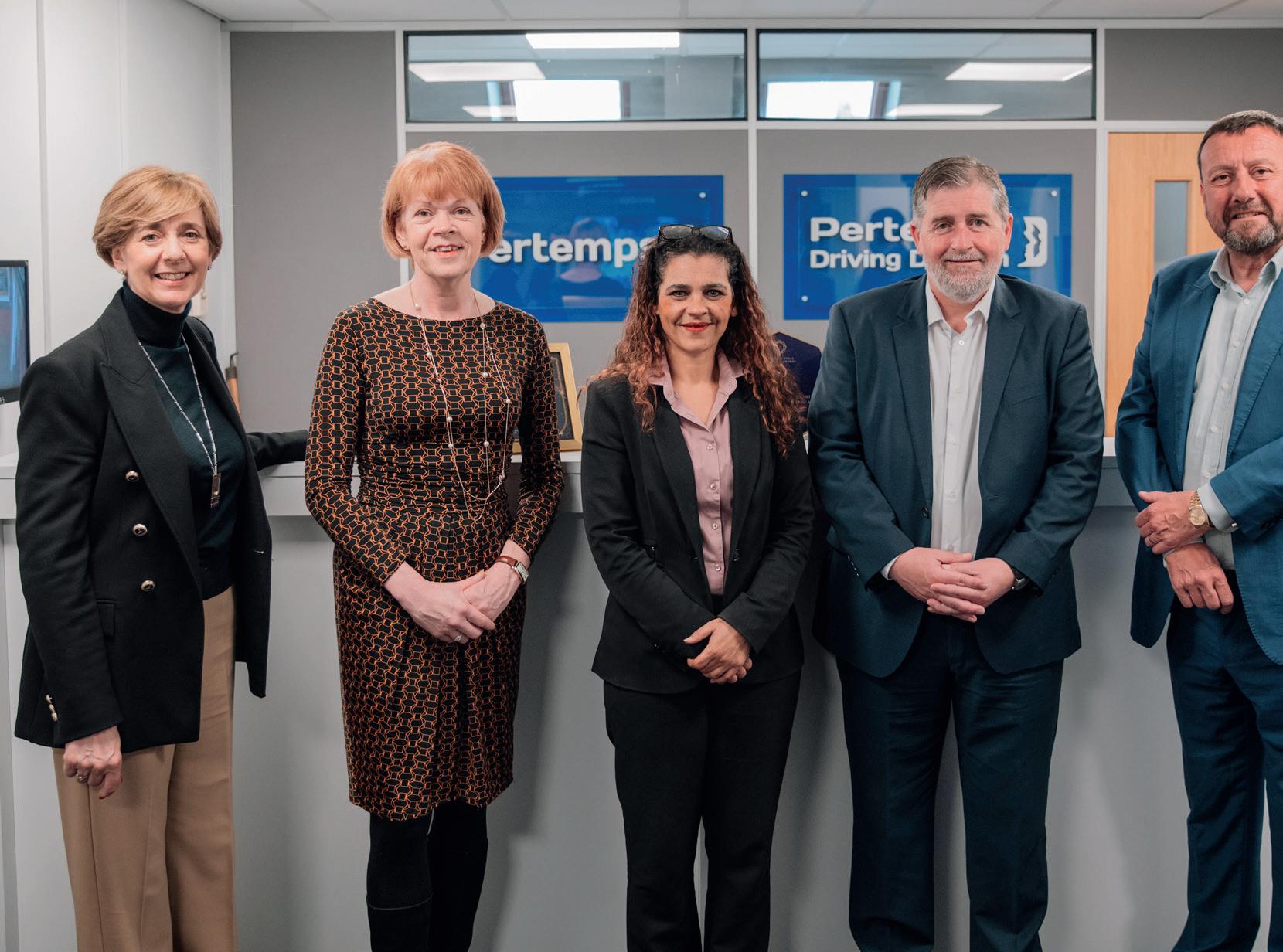
Wendy Morton MP visits Pertemps office in Aldridge
to see how its commitment to breaking down barriers is making a difference in the West Midlands
52 Fit for Purpose Magazine
Pertemps
MP
for Aldridge-Brownhills, Rt Hon Wendy Morton, visited her local Pertemps office in Aldridge to meet staff and get an insight into how the business is helping to break down barriers for people in the West Midlands.
Morton met Group HR director Tracy Evans and Operations Director Will Hodson and spoke to staff about the challenges facing the labour market and how Pertemps is helping to get people back into work.
Pertemps is the UK’s largest recruitment agency, with over 200 offices across the UK. It directly employs 1,550 members of staff, manages up to 40,000 temporary workers for clients at any one time and places around 12,000 candidates in permanent roles each year.
It has been working in partnership with the Purpose Coalition to deliver a positive social impact for its colleagues, clients and communities across the country. As part of that work, it published a Levelling Up Impact Report which highlighted how the company is boosting social mobility, showcased its best practice and considered how it could go even further.
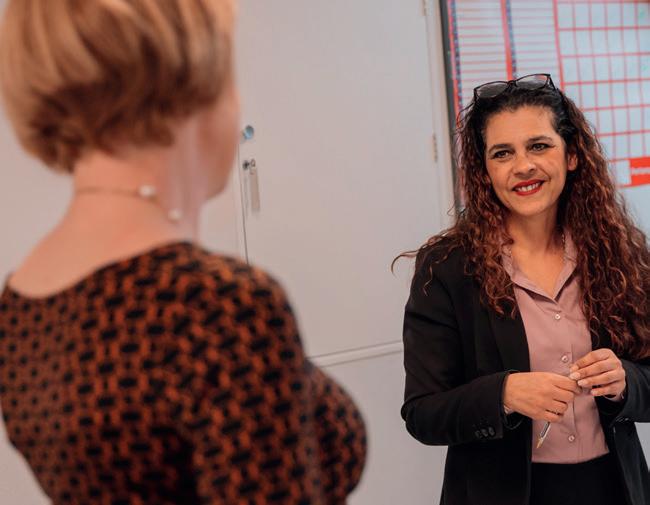

Pertemps subsequently hosted a series of roundtable discussions for major private sector employers and public bodies which formed the basis of a report, The Workforce of the Future. This presented solutions for businesses to help them to connect the opportunities they can offer with talent, to find and develop the right skills for these roles and to increase engagement with their colleagues while building for the future.
It highlighted the importance of:
- Promoting resilience and a proactive response to economic shocks;
- Adapting to the post-pandemic workplace shift;
- Investing in the workforce of the future;
- Fostering long-term economic resilience.
53 Fit for Purpose Magazine Pertemps
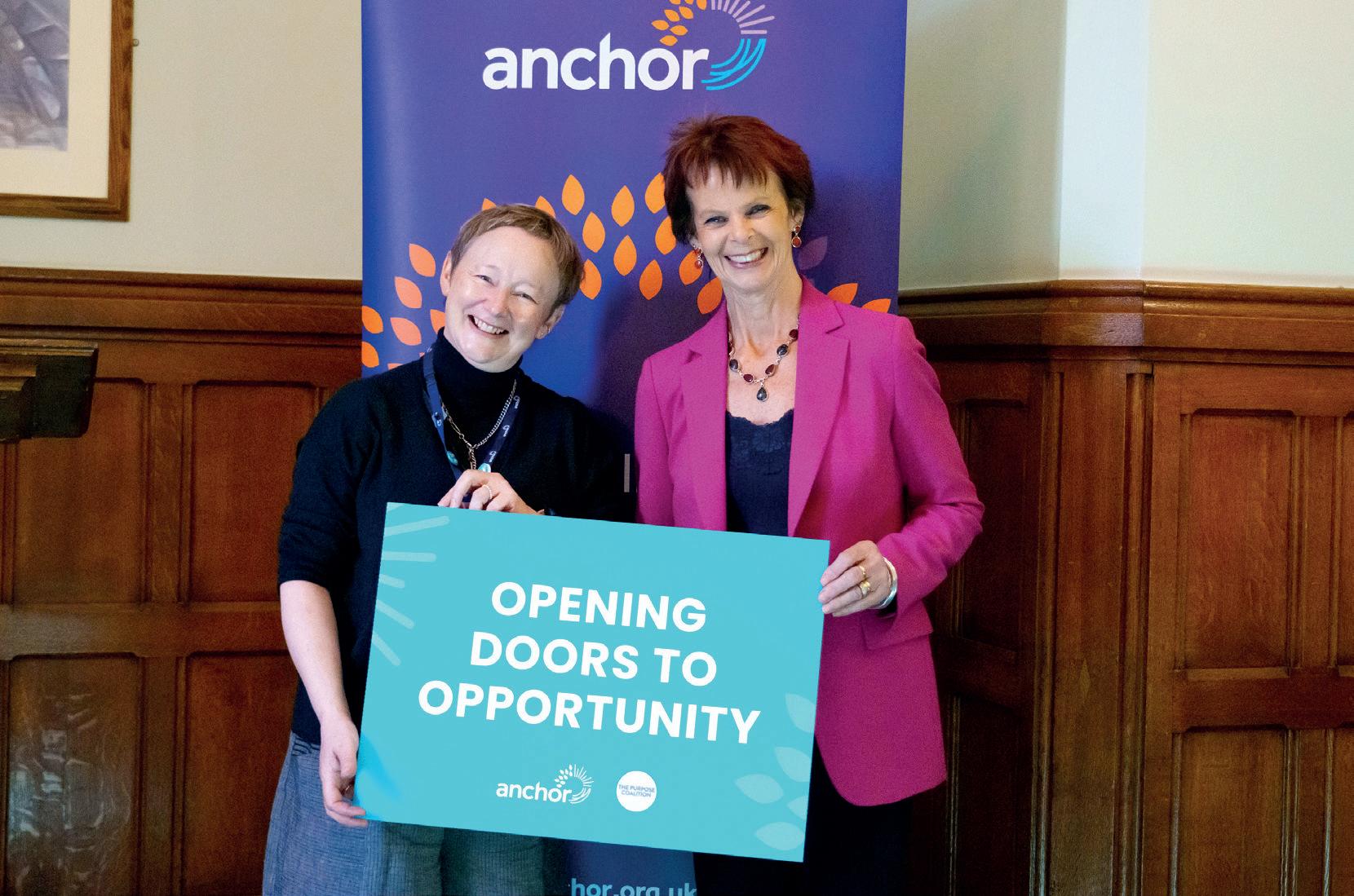
Delivering social impact: Anchor celebrates report launch at House of Commons
The social impact of Anchor, England’s largest provider of housing and care for people in later life, is documented in a report which was launched at the House of Commons on Tuesday 30 April.
The report, developed by the Purpose Coalition, reveals Anchor’s work to contribute to the communities it serves. It makes Anchor the first housing association to collaborate with the Purpose Coalition to assess its impact against a framework which builds on the UN’s Sustainable Development Goals.
The Purpose Coalition brings together parliamentarians and businesses to improve the role that organisations can play for their customers, colleagues, and communities, and is chaired by Rt Hon Justine Greening, the UK’s former Secretary of State for Education, Transport and International Development.
54 Fit for Purpose Magazine Anchor
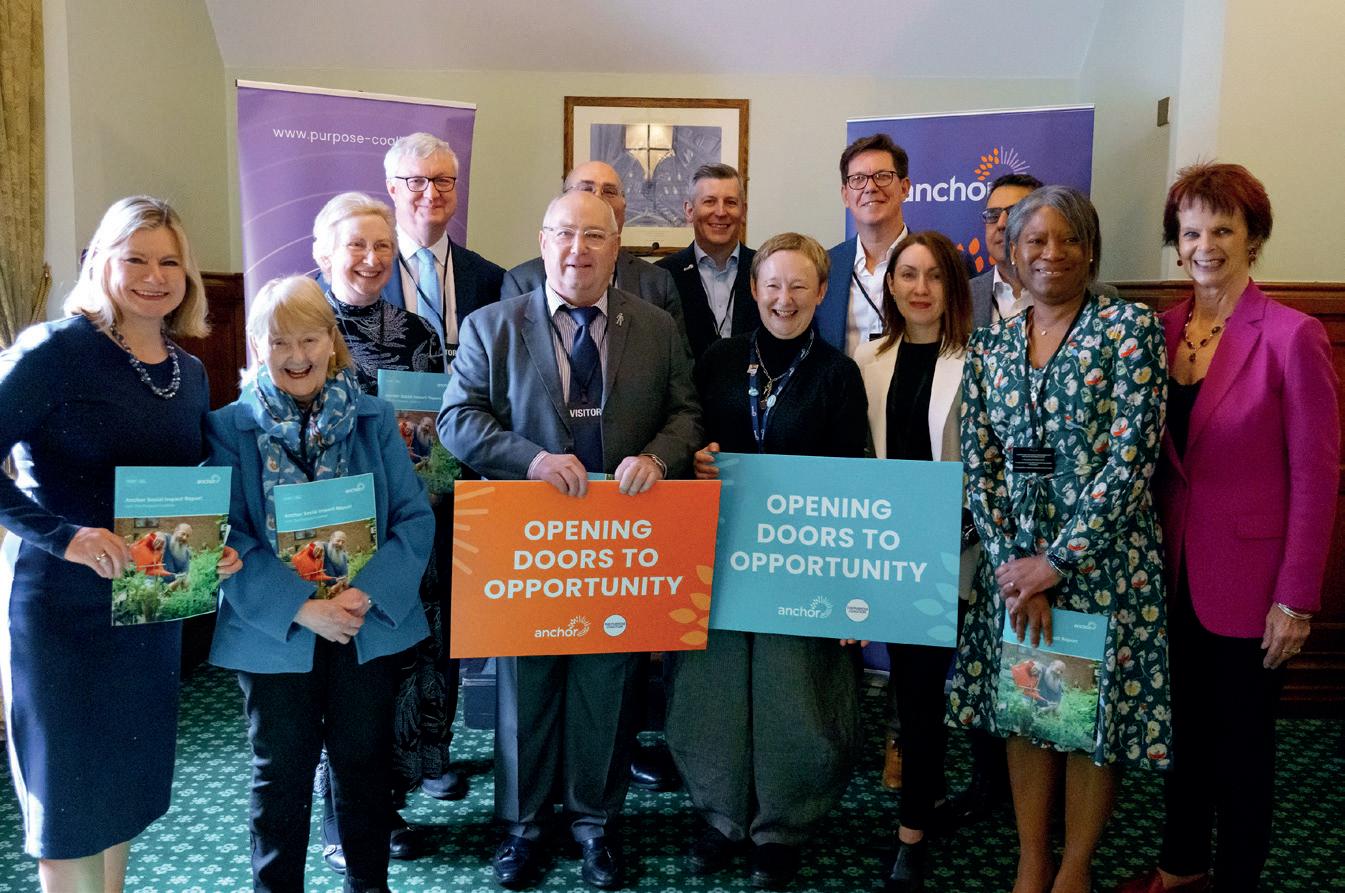
The Coalition assessed Anchor’s activity against a framework of 14 interconnected goals that measure social impact. Building on the foundations laid by the UN’s Sustainable Development Goals, they have been shaped by expertise from academia and business and adapted to tackle the unique challenges in the UK.
The goals span a range of issues, from providing positive destinations for those over 16, to building homes and sustainable communities, and achieving equality through diversity and inclusion.
The report praises Anchor for its commitment to driving change to benefit the communities in which it works. It highlights a sharp focus on residents’ wellbeing and support for colleagues in areas including bereavement, menopause and financial inclusion.
It also highlights successes in supporting young people into meaningful roles, ensuring a pipeline of diverse talent through its apprenticeship opportunities, and development of its staff with clear, supported career pathways.
Chair of the Purpose Health Coalition and Former Minister for Public Health, Rt Hon Anne Milton, said: “Purpose-led organisations like Anchor not only have a key role to play in our health and social care system through the provision of specialised housing and care services but can also lead the way in delivering opportunity across the country. This report demonstrates how Anchor’s comprehensive social impact approach is characterised not only by a dedication to its residents but also by an acknowledgement that its resident offering is interconnected with its colleague agenda and community approach. It has the potential to be a powerful voice for the sector, advocating for the older people it serves and for those who work in it.”
Chief Executive of Anchor, Sarah Jones, said: “Anchor is committed to providing homes where people love living in later life, opening doors to opportunity and empowering our residents, colleagues and communities across the UK – and the Purpose Goals have given us a useful framework for our efforts. While the Coalition has worked with a wide range of organisations, we are proud to be the first housing association to work with them in this way and hope this provides a valuable step forward in building a more equitable society.”
55 Fit for Purpose Magazine Anchor

56 Fit for Purpose Magazine NCG and Capital City College Group Breaking Down Barriers Commission announces strategic partnership with further education providers to tackle inequality
New initiative, the Breaking Down Barriers Commission, today announced a strategic partnership with two major further education providers.
A collaboration with London’s largest further education provider, Capital City College Group, and leading countrywide college group, NCG, will explore ways in which they can make a difference for their students, staff and the communities they serve while leveraging their sector leads.
Chief Executive Officer at CCC Group, Angela Joyce, will be the college sector lead for London for the Commission and NCG’s Chief Executive, Liz Bromley, will be college sector lead for the North of England.
The Breaking Down Barriers Commission is led by Nick Forbes CBE, a former member of Sir Keir Starmer’s Shadow Cabinet, and was set up to deliver equality of opportunity. It is the UK’s fastest growing network of socially responsible and progressive businesses and organisational leaders. Together they are working collectively and cross party to change society for the better by redefining the role of business in society and seeking new ways of constructive engagement with government.
The Commission’s work with the College Groups will focus on developing innovative strategies to remove the systemic barriers that prevent individuals from reaching their full potential, regardless of their background or circumstances.
Nick Forbes said: “I am delighted to welcome Capital City College Group and NCG as new members of the Breaking Down Barriers Commission. Their vision of enabling social mobility and transforming lives through exceptional education and training closely aligns with the Commission’s vision of delivering opportunity to everyone everywhere, regardless of background, through a focus on a practical, evidence-based approach. It is crucial that we find common ground across sectors and organisations if we are to make tangible progress
in driving positive societal change and I am looking forward to partnering with them as valued members of the Commission to help achieve a fairer society.”
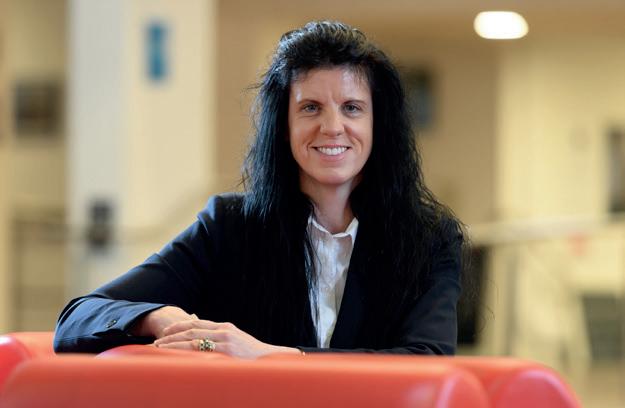
“As the largest college group in London we have a long history in serving diverse communities in inclusive and equitable ways. We are committed to reducing inequality and creating opportunities for all. Partnering with Breaking Down Barriers Commission allows us to explore new and innovative ways to provide exceptional education opportunities which can make a difference for students, staff and the communities we serve whilst also making a positive impact on society.”
CEO of NCG, Liz Bromley, said: “NCG exists to create life-changing opportunities for individuals, and our seven colleges are at the heart of diverse communities across the country. The Breaking Down Barriers Commission wholly supports and aligns with NCG’s mission to enable social mobility and economic prosperity through exceptional education. The further education sector is key to economic recovery and this partnership will provide us with even more opportunity to make a positive impact on society, allowing us to accomplish real change for the individuals and communities we serve.”
57 Fit for Purpose Magazine NCG and Capital City College Group
CEO of Capital City College Group, Angela Joyce, said:
Strategic Economic Plan approved at Cabinet
This is an exciting time for Warwickshire, as members of Warwickshire County Council have given their approval for the new Warwickshire’s Strategic Economic Plan at Cabinet on Wednesday 11 April.
This is a Warwickshire-wide strategy that sets out the purpose for Warwickshire to have an economy that is ambitious, inclusive and sustainable which will be achieved by working with a wide range of partners and focus on building a strong viable and resilient economy.
Work is already underway to establish a delivery plan that will underpin and help achieve the key objectives in the SEP.
Warwickshire’s Strategic Economic Plan highlights the work that the county and its partners are doing with three pillars that are key to developing an economy that is: - fit for the future
- that will grow and create jobs for all of the county’s communities
- and will be sustainable and contribute to the county’s net zero carbon emission targets.

Talent – attracting and retaining it with high-quality employment – is integral to Warwickshire’s growth.
58 Fit for Purpose Magazine Warwickshire County Council
The three pillars of the Strategic Economic Plan each have dedicated areas of focus which includes the actions that will be taken to create impact and the outcomes.
The Ambitious Growth pillar encompasses supporting businesses with high growth potential to start or scale ie grow organically at a manageable rate and a future economic strategy will seek to increase the numbers of businesses accessing finance. It highlights how the County Council will continue to foster research and development.
The infrastructure of the transport system and digital connectivity and ensuring that land supply meets the needs of growth are key aspects.
Talent – attracting and retaining it with high-quality employment – is integral to Warwickshire’s growth. There are plans to work with the Department for Business and Trade to investigate potential for exporting.
The Inclusive Growth pillar will target support for employment and will look to work on the outstanding success of the Warwickshire Supported Employment Service, which has made such strides since its launch in engaging some of the county’s residents who have previously struggled to find employment with businesses. It will also bring together local partners such as the Growth Hub and the Chamber of Commerce and national partners including the Department for Work and Pensions.
Raising aspirations in low output areas of the county and developing clear career pathways will be among the targeted support for employment, as the strategy seeks to level up opportunities across Warwickshire. Regeneration of priority areas and empowering communities will be key to achieving this. The strategy will seek to encourage enterprise in such areas as well as in under-represented groups such as women or minority ethnic backgrounds.
The developing jobs market is another core focus of the county’s planning with schools and colleges being supported to develop career activity that is relevant for the needs of the future.
Finally, Sustainable Growth, which will underpin businesses’ transition to net zero, makes up the third pillar. Supporting low carbon tech businesses and encouraging new ones while ensuring there are the skills in the job market to make the transition is key to the plans for the strategy. Key partners will be assisted in decarbonising transport across the county. Businesses will be supported to reuse, recycle and reduce materials. Residents will be encouraged through various means across a range of council services to increase the use of active travel; businesses will be supported in a move to using sustainable freight.
Councillor Martin Watson, portfolio holder for Economy at Warwickshire County Council, said:
“This Strategic Economic plan is vital for the local economy, it sets out the ambition recognising the amazing assets and economy we already have in the county, and looking to continue to be a leading economy for the region and the UK for the next 10 years. It is important that this strategy reflects the work that is currently underway and the wide range of partners and stakeholders who also share an interest in the success of our economy. The plan has been created with the input of Warwickshire’s businesses and other stakeholders, to ensure the plan addresses local needs and supports our businesses and economy into the future.
“The way we shaped our plan – talking to districts and boroughs, partner, businesses and taking their views on board - is testament to our commitment to working collaboratively. Together, we want our businesses to grow, our residents to have good jobs to improve their health and to ensure Warwickshire has a sustainable future.”
59 Fit for Purpose Magazine Warwickshire County Council
Business and Trade Select
Committee Chair Rt Hon Liam Byrne joins senior business leaders for Westminster roundtable
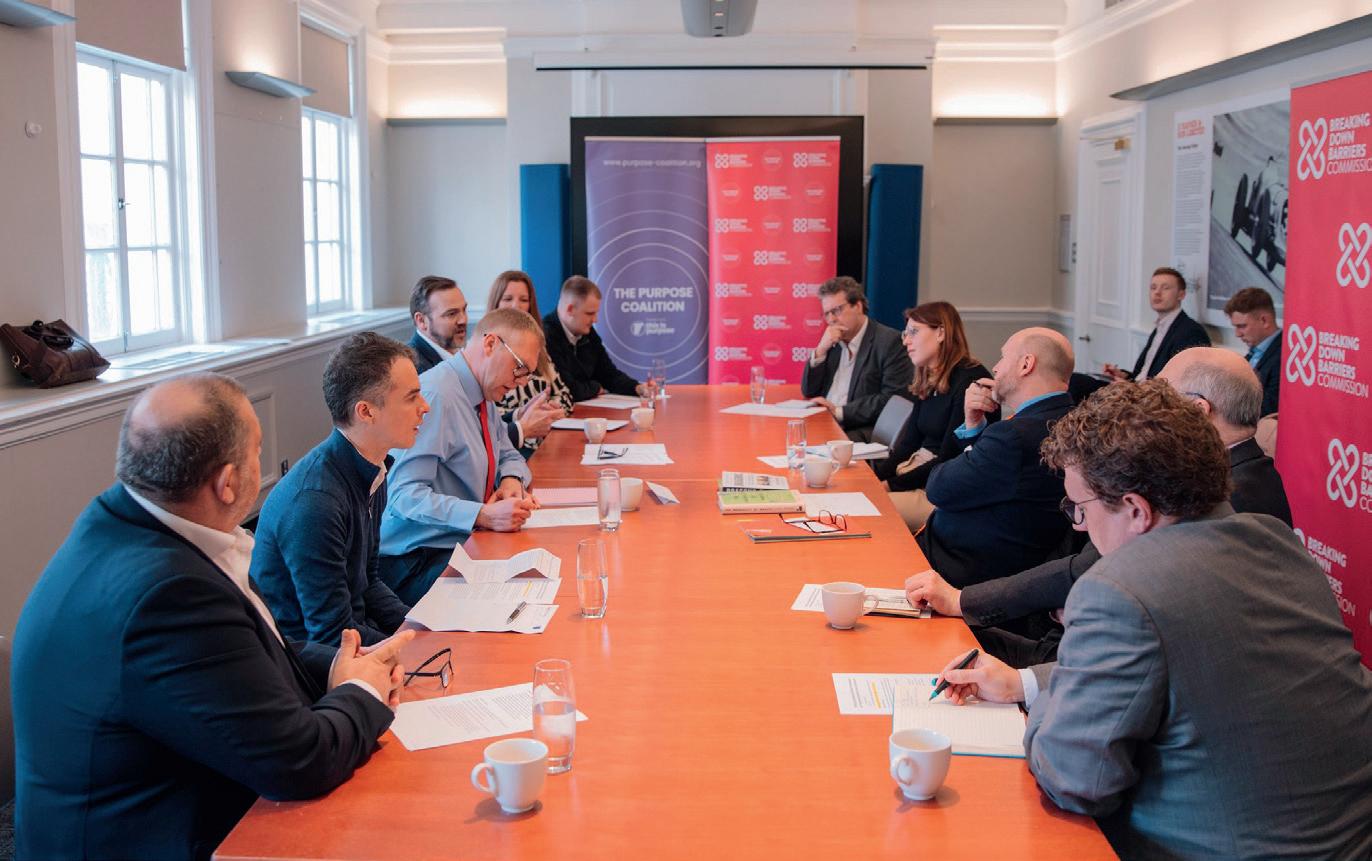
Senior business leaders today joined Chair of the Business and Trade Select Committee and former Chief Secretary to the Treasury, Rt Hon Liam Byrne MP, at a major roundtable in Westminster that explored the leadership role that British business can play in tackling barriers to opportunity in partnership with the next government.
60 Fit for Purpose Magazine
The Purpose Coalition

Working collaboratively will be a much more effective way of making a significant impact.
Participating businesses included Centrica, Hudson Contract Ltd, Ramsay Health Care UK, the Co-op Group, Exensor, Reed in Partnership, Leonardo UK and more.
The roundtable was hosted by Nick Forbes CBE, Chair of the Breaking Down Barriers Commission, part of the wider Purpose Coalition, and former member of Sir Keir Starmer’s shadow cabinet.
The event looked at how businesses can work with a future government to address key challenges in decision making, giving policymakers and industry experts the opportunity to raise general and sector-specific concerns and to discuss private sector solutions. There was a particular focus on Labour’s five ‘Missions for a Better Britain’ and how a partnership might support enterprise in local communities and break down the broader barriers to opportunity that still exist in many parts of the country.
Nick Forbes CBE, Chair of the Breaking Down Barriers Commission and former Member of Keir Starmer’s Shadow Cabinet said:
“The Business and Trade Committee plays a crucial part in providing advice to the government, holding it to account and developing policy ideas. This roundtable with Liam was a fantastic opportunity to bring business and government together to see how they can work in partnership to help break down barriers to opportunity.
Members of the Breaking Down Barriers Commission share a vision for redefining the role of business in addressing societal and economic challenges and are keen to explore avenues for constructive engagement with government. There is a resolve to effect transformative change so that there is a clearer path towards encouraging enterprise, achieving net zero as well as the improved economic growth that this country needs. Working collaboratively will be a much more effective way of making a significant impact.”
The Breaking Down Barriers Commission is part of the wider Purpose Coalition and has been set up to deliver a collective focus for businesses and other organisations in the run up to a general election and beyond..
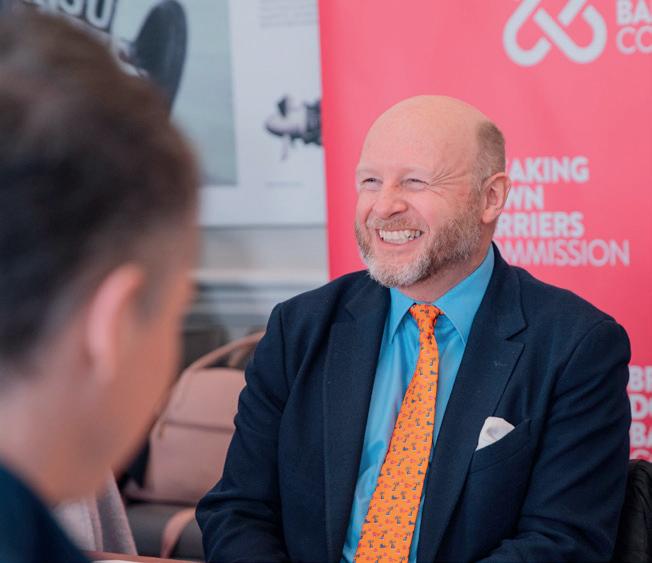
61 Fit for Purpose Magazine The Purpose Coalition
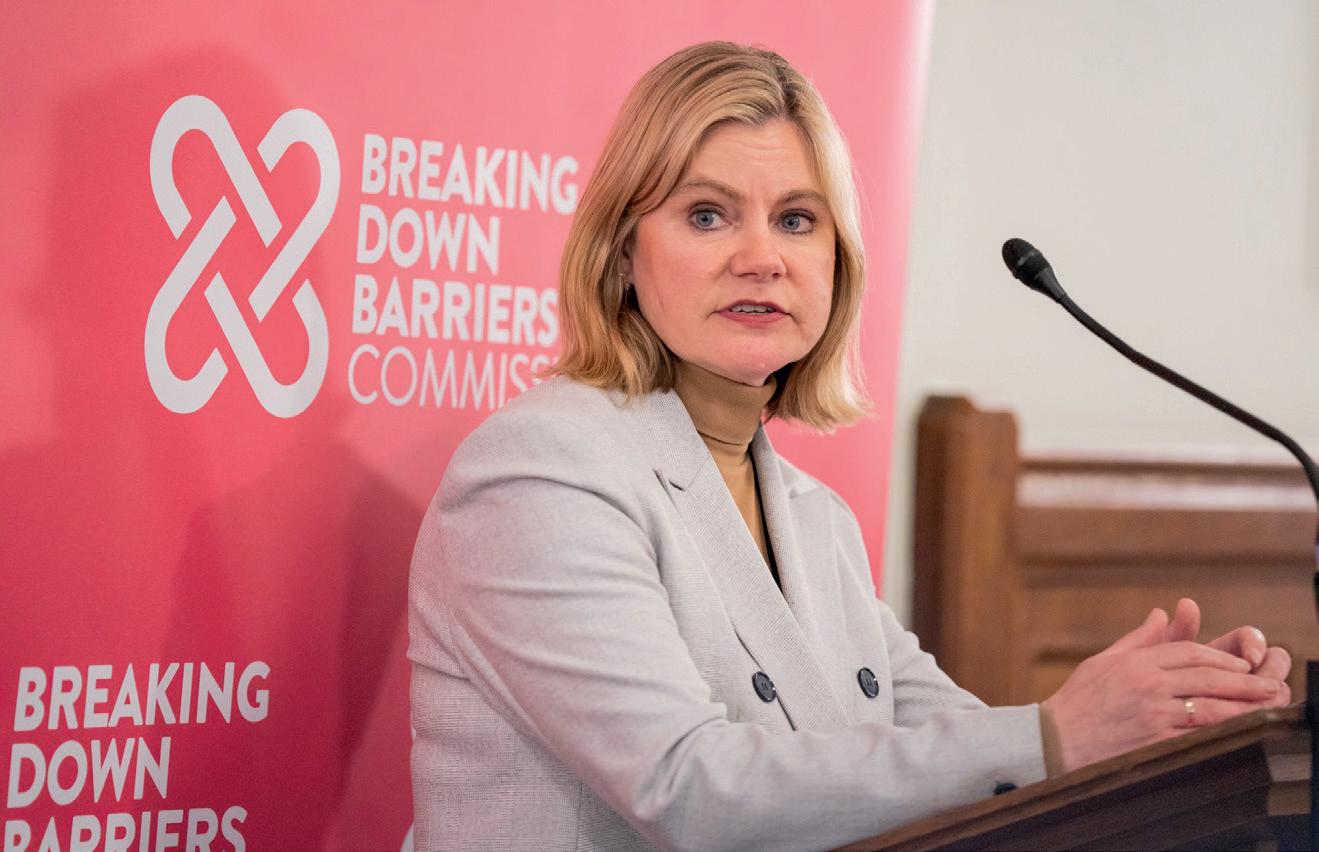
The Breaking Down Barriers officially launches in Parliament – a new social contract to power-up Britain.
The Purpose Coalition’s new Breaking Down Barriers Commission has officially launched in Parliamentan important initiative to tackle inequality with a renewed partnership between government and industry.
The new Commission will focus on identifying and removing barriers to opportunity, supported by politicians, policymakers, businesses, universities, healthcare organisations and local authorities.
The launch also featured a report, Breaking Down Barriers Commission: The Vision and Purpose, which sets out why the current political, economic and social and landscape demands a better understanding of the structural challenges that contribute to inequality.
62 Fit for Purpose Magazine Breaking Down Barriers Commission
It redefines the role of business in society and seeks new ways of constructive engagement with government.
It calls for more innovative thinking on solutions that will deliver transformative change for people across the country and includes a blueprint for action.
The report highlights each of the barriers to opportunity, underpinned by the Purpose Goals developed by the Purpose Coalition and already adopted by over 100 leading organisations across sectors and industries. It also includes for the first time a new goal, Goal 15 Working in Partnership, which acknowledges the importance of strategic engagement across all sectors as a delivery partner for social and economic progress, as well as through alliances with trade unions and employee assemblies.
Chair of the Breaking Down Barriers Commission and former member of Sir Keir Starmer’s Shadow Cabinet, Nick Forbes CBE said:
“In these difficult times of increasing political division, economic uncertainty and geopolitical insecurity, it is more important than ever to bridge the divide and find common ground on tackling issues of inequality. Partnership is a vital tool in connecting organisations from different sectors and of different sizes who nevertheless have a shared vision of a fairer society.
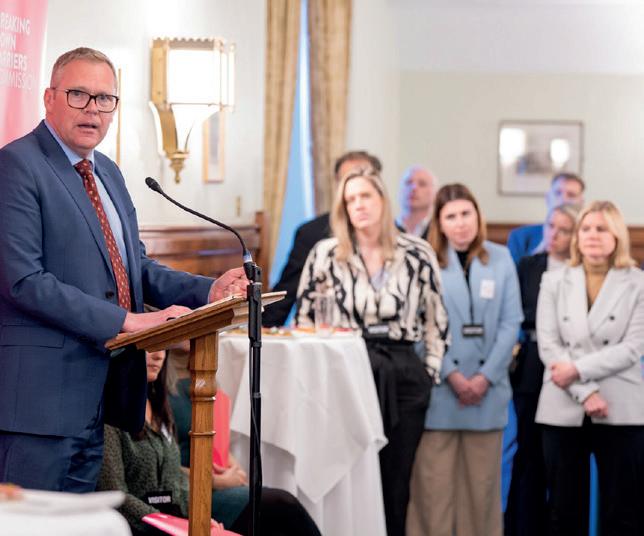
“The report we have launched today is the Breaking Down Barriers Commission’s blueprint for action. It is part of a strategic, long-term approach that represents a move away from semantics and slogans towards effecting more tangible change in removing the barriers to opportunity. It redefines the role of business in society and seeks new ways of constructive engagement with government. It represents a more collaborative effort to shape a future where business not only prioritises profitability but actively contributes to improving the lives of its customers, colleagues, and communities.
“Over the coming months, the Commission will be working closely with businesses, politicians and potential candidates to develop workable solutions that reflect the wider population’s desire to see a more equitable society that harnesses the talents of everyone, regardless of their background or where they are from.”
Chair of the Purpose Coalition and former Education Secretary, Rt Hon Justine Greening, said:
“Social mobility has been stagnant in this country for decades. The pandemic and the cost-of-living crisis have made that situation worse, with increasing inequality especially in our most deprived areas. That wastes talent and robs individuals, communities and regions of a positive and prosperous future.
“There is clear cross-party agreement that we need to address this critical issue, and better understand its root underlying causes, if we are to achieve the growth the country needs. The Breaking Down Barriers Commission continues the work of the Social Mobility Pledge and the Purpose Coalition in bringing together like-minded organisations who focus on a practical and evidence-based approach to creating equality of opportunity and who have a wealth of successful best practice they can share with others.”
63 Fit for Purpose Magazine
Barriers Commission
Breaking Down

It’s time to close the UK’s life expectancy gap
Our country has a lottery of birth, where the location a child is born can predict how long they will live with high accuracy.
The health gap we are faced with in this country is stark. Based on current data, it can be expected that a male born in Blackpool will live ten fewer years than those born in Hart; and a female born in Blaneau Gwent will live seven fewer years than those born in Kensington & Chelsea.
Where you are born should not determine how long you will live. Unfortunately, this is becoming an increasing reality in the United Kingdom.
While there is a clear ‘north-south divide’ across the country in terms of average life expectancy, there are inter-regional and demographic & ethnicity related disparities that call for a more nuanced understanding.
This ‘upstream’ nature of health inequalities is placing ‘downstream’ pressure on the NHS. A report by the Red Cross, ‘Nowhere Else To Turn,’ identified that people from the most deprived areas of the country were most likely to be in poor health and attend A&E most frequently.
64 Fit for Purpose Magazine Callum Crozier
In this crucial election year, there is no better time to encourage a renewed approach to the health of our nation and the divides that exist.
It also reports that patients who attend A&E more than five times per year represent 16% of total attendances, and almost a third of all ambulance journeys and hospital admissions at the cost to the NHS at least £2.5 billion a year.
In a developed nation, not least a nation with the sixth highest GDP in the world, this should not be the case.
The current politics of health is not particularly helpful in addressing these realities. At the upcoming general election we can see the headline messaging from the Prime Minister related to health as ‘cutting NHS waiting times’ and from Labour we see a mission on ‘getting the NHS back on its feet.’
While both are critical and much needed - and the NHS obviously needs to reduce its waiting times, become more efficient and improve clinical outcomes – this is not reaching the root cause of wider health inequalities across the UK.
We need a smarter, holistic national health strategy that looks to address the root causes of preventable sickness and disease that is the advent of health inequalities across the UK.
In our work on the Breaking Down Barriers Commission, a newly launched programme within the Purpose Coalition, we are focusing on how we can develop a clear strategy on breaking down barriers to health and wellbeing across the UK.
This will be focusing on three key areas, among others as it develops:
Getting beyond the ‘sticking plaster’ approach
We’ll be seeking to ensure that across political parties, politicians and policymakers begin to develop a wider national health strategy that goes beyond sticking plasters solutions of cutting NHS waiting lists and efficiencies, instead beginning to recognise, target and solution the ‘upstream’ health inequalities throughout communities across the UK.
This will require additional initial resource, but will have social return on investment as well as fiscal relief in the long-term.
Businesses are helpful partners in supporting employee health & wellbeing
We want to ensure that business is seen as a critical partner in developing this national health strategy and breaking down barriers to health and wellbeing.
With 82% of those employed across the UK working in the private sector - coupled with the reality that people often spend more time at work than they do with their families - businesses can be a key steward of the health and wellbeing of their employees.
Understanding of positive health and lifestyle choices
A joined-up approach in the education system that seeks to promote ‘healthy’ lifestyle choices, whether in the classroom, or supporting new parents in making the right choices for their young children in the critical developmental ages of 0-4.
Turning the tide
In this crucial election year, there is no better time to encourage a renewed approach to the health of our nation and the divides that exist.
Our mission is to ensure where you are born does not determine how long you will live, nor how well you live those years.
The inequality of life expectancy is one of the most dangerous and critical problems we face as a country.
It’s time to turn the tide and set out a clear plan on how we can close the UK’s life expectancy gap.
65 Fit for Purpose Magazine Callum Crozier
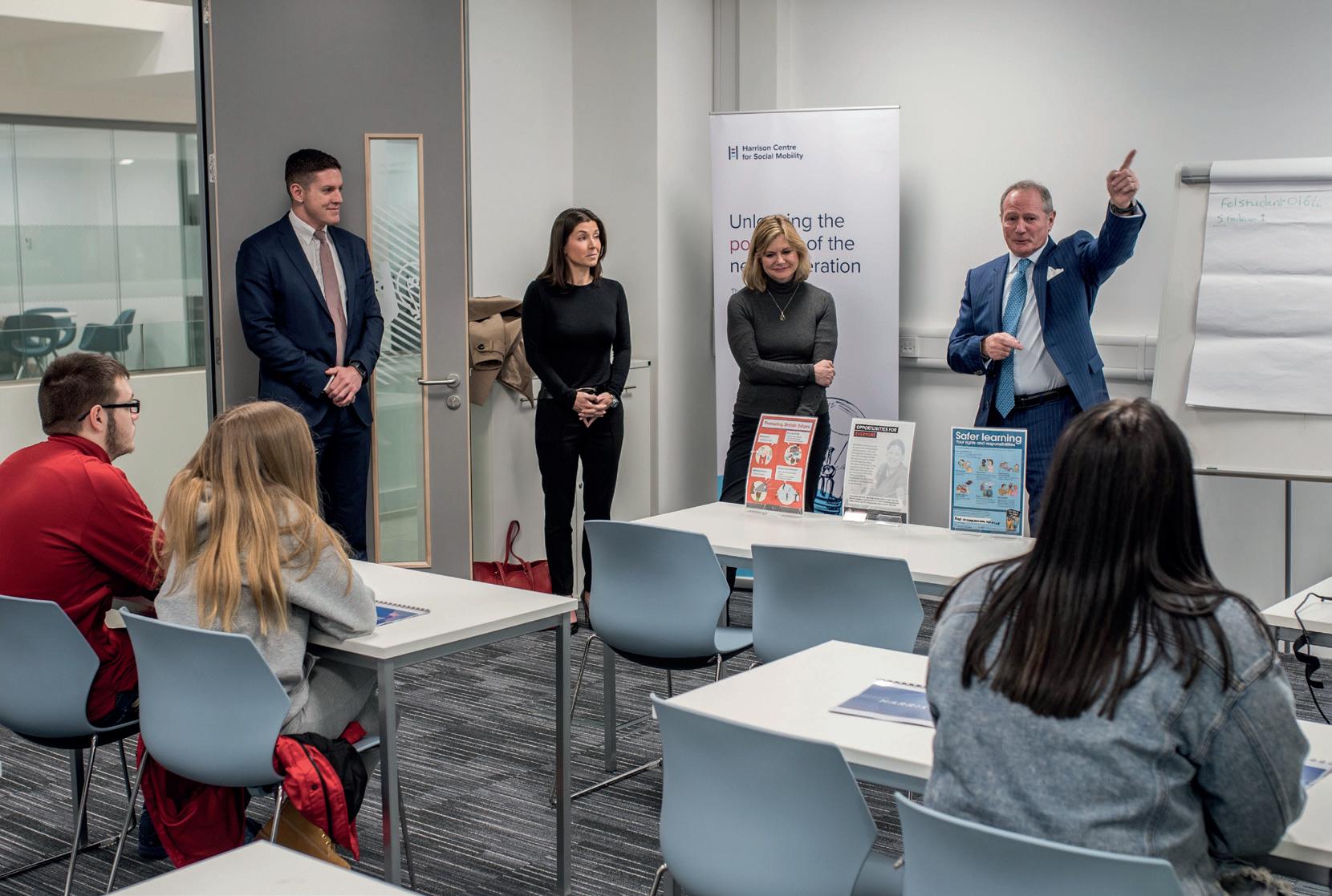
Harnessing the power of sport to drive social impact
Sport can be an immensely powerful tool in giving young people the confidence and self-esteem to do well in life as well as supporting their physical, emotional and mental wellbeing.
It also has the potential to engage with young people, particularly those from more deprived areas of the country, to provide them with the vital education and employment skills that, for a variety of reasons, they might have missed out on at school. As integral parts of their local communities, sports organisations can play a huge part in breaking down the barriers that prevent people from accessing opportunity and enabling opportunity.
The Harrison Foundation is an organisation that takes its commitment to young people seriously, with a firm belief that no young person should miss out on opportunity because of their background or upbringing. Through the Foundation’s six Centres for Social Mobility, it also recognises that the route to opportunity can be made much more effective through partnerships with sporting organisations.
66 Fit for Purpose Magazine
The Harrison Foundation
The Harrison Foundation has just renewed its partnership with Newcastle United Foundation for a third year, offering similar programmes that help employers, young people and the unemployed connect to opportunities.
It recently renewed its partnership with the Sunderland FC’s charitable arm, the Foundation of Light - first formed in 2017 - which will see hundreds of young people on Wearside continue to access vital education and employment skills. The Harrison Centre Sunderland is based at the Beacon of Light and the collaboration will ensure another year of tuition and training from the Harrison Centre to help unemployed and young people who have recently left school to grow in confidence, gain qualifications and skills and ultimately secure a job. It has enabled hundreds of young people to take part in courses that provide them with essential skills in IT, finance, Maths and English, Personal and Social Development as well as industry specific qualifications. It delivers a range of programmes including enterprise for secondary school pupils, post-16 Harrison Challenges, apprenticeships, traineeships, adult employability, 16-19 employability and family learning.
Supported by over £600,000 of investment since 2017, it is making a real impact on the lives of young people in the region, delivering almost 750 sessions to date with significant success rates for learners going into further education or securing employment. In 2022/2023, it supported 263 learners. In the 16–18-year-old age range, there was an 86 per cent overall success rate, with 27 per cent of learners going onto sustained work and 59 per cent going onto further education. In the 19+ age range, there was a 55 per cent overall success rate, with 30 per cent of learners going onto sustained work and 25 per cent to further education.
Collaboration with local employers is key to achieving results. In the engineering sector for example, the Foundation’s partnership with Vantec, a significant part of Nissan’s supply chain, has resulted in 22 young people going onto full time employment with a company that has previously found it difficult to recruit staff to work in its two main sites in Sunderland. It is also working with providers in the health and social care sector and
on construction to provide direct routes to recruitment for its participants. The digital space the partnership provides is particularly important against the background of a growing creative enterprises agenda in the North East, including the planned new Crown Works Studios in Sunderland. Working with employers in the sector to develop a digital curriculum for 2024/2025, programmes will be delivered to 16–25-year-olds, with elements of employability and personal growth modules alongside sector specific qualifications.
As the first Harrison Centre, the Beacon of Light Centre in Sunderland is regarded as a flagship project although there are now five further Centres across the region and beyond. The Harrison Foundation has just renewed its partnership with Newcastle United Foundation for a third year, offering similar programmes that help employers, young people and the unemployed connect to opportunities. The Esports Arena at NUF has seen over 3000 participants access the space, with over 300 individual sessions taking place since the start of 2023. Many young people now use the facilities regularly. Its first cohort of students have now completed a two-year BTEC Esports course. Out of the eight second year learners that achieved qualifications, five have gone on to secure employment and one has progressed to university.
Daniel Harrison, Foundation Trustee and CEO of True Potential, a locally based and leading financial services company, said: “The Harrison Foundation has always strived to develop meaningful connections with local partners who share the same values to ensure that young people in the area have the best chance of accessing opportunity. Our collaboration with the Foundation of Light at Sunderland and with the Newcastle United Foundation show that harnessing the power of sport allows us to make an even greater difference, targeting our support to those who need the most help and equipping them with the skills that local industries need.”
67 Fit for Purpose Magazine The Harrison Foundation
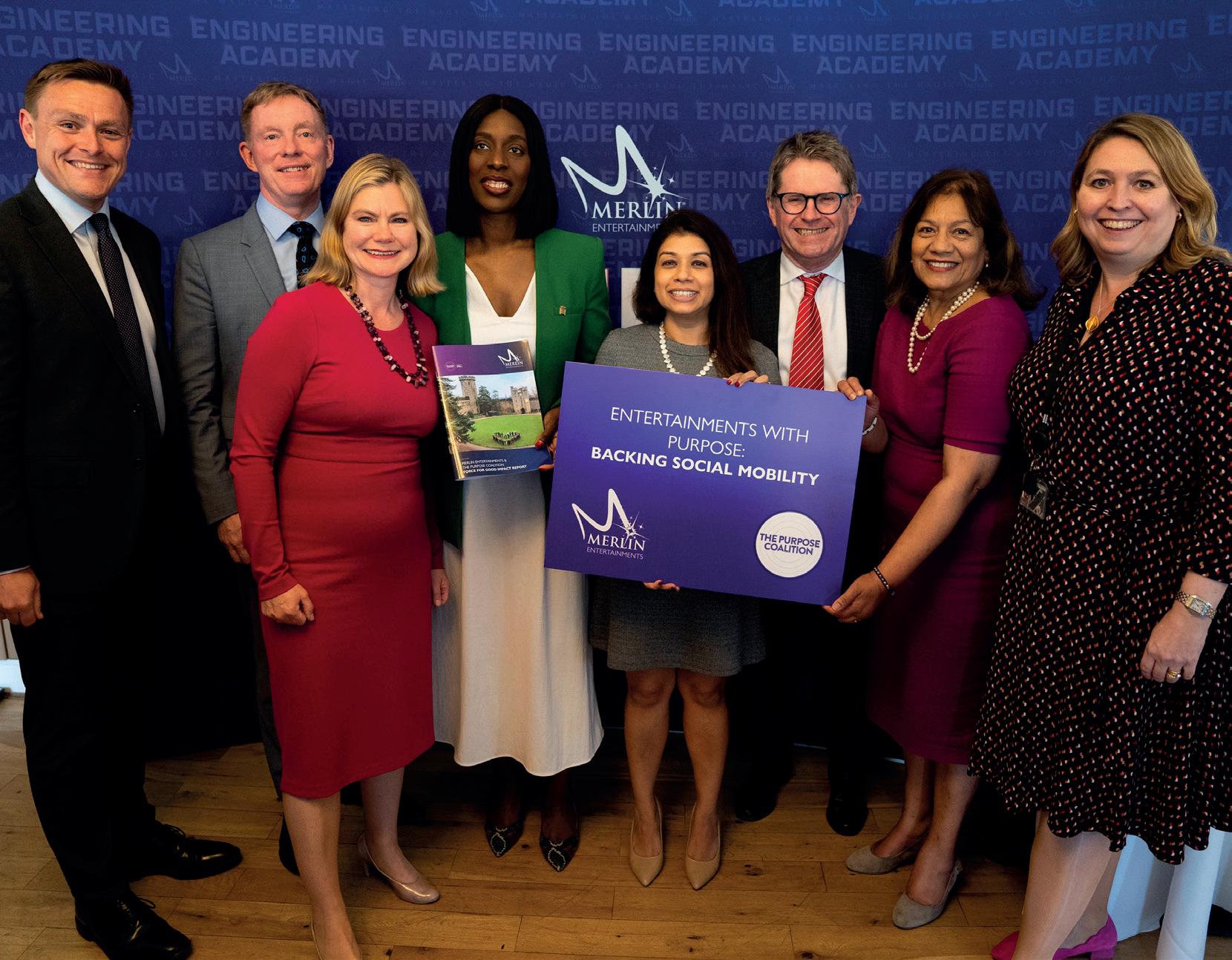

LEVELLING UP
68 UWE Bristol Fit for Purpose Magazine
FIT FOR
Merlin Entertainments is proud to partner with the Purpose Coalition



































































